#it really seems like every religion in this universe is good EXCEPT FOR CHRISTIANITY
Explore tagged Tumblr posts
Text
that new castlevania netflix show is uh.......it sure is somethin
#shut up ash#yall it's bad#things are happening but nothing is fucking happening#all the main characters are so bland#richter isnt the main character it's annette#she's a mary sue and i hate iiiiiitttt#the fight scenes are so lackluster#at one point i thought we were gonna get a cool training arch for richter since they introduced his grandfather#BUT NO!! he unlocked his magic and got a power up JUST BECAUSE he thought about his friends while getting beat up#TWO OF WHICH HE'S KNOWN FOR LITERALLY JUST A DAY OR TWO!#literally the only good things about this garbage show so far are orlax and the pink sassy vampire#i really really like orlax#also most of the voice acting is terrible#also im TIRED of the church being secretly evil all along#it really seems like every religion in this universe is good EXCEPT FOR CHRISTIANITY#like im bored of it now can we do something different with the church i am on my knees begging#feels like they've made the church evil just for the sake of it...there is no substance to it at all#in fact there is little to no substance in anything in this show#how have they fumbled castlevania SO HARD after nailing seasons 1 and 2#u g h
4 notes
·
View notes
Text
I find Americans talking about religion fascinating because they think the weird pentecostal/evangelical eschatology cults are Normal Christianity and not like. a really specific thing.
and that is by no means to say Christianity elsewhere is less fucked up but it's different.
like Americans will say stuff like "like most Christians, this cult believes we're in the end times and have to reclaim Zion to bring about Revelations, but what's weird about their beliefs is..." and it's like???? WHAT DO YOU MEAN LIKE MOST CHRISTIANS?????
like Scotland's still a pretty Christian country. some of the biggest sociopolitical divides are Christian sectarianism. we got Presbyterians we got Catholics we got Episcopalians we got Quakers (hi) we got Baptists and Methodists and Jehovah's Witnesses and so on. half of the population are Christian. but I don't think I have ever met more than a handful of people whose Christian belief is focused on Revelations and the end times. that's weird stuff my guys.
my outside appraisal of American Christianity is that it looks really very samey. there doesn't seem to be a lot of significant theological difference, or tbh aesthetic difference, between a good number of the major churches. worship practise, structure, and the focus on sin, evangelism and apocalypse seem to be way more common threads there than in Europe. and I feel like people grow up in that and think that means all Christianity is the same as that. which like. it isn't.
A lot of folks I know who've been to American Quaker communities, for example, have been really surprised at how much some Meetings in the US are cramming into the same episcpentamethodbaptitradcathevangelist church model - fire and brimstone preachers, our god is a great big god songs, focus on end times prophecy - and it just doesn't. line up with the degree of diversity in practise and focus for different Christian sects in most other parts of the world. where like. those types of churches also exist (the evangelical born-again rapture and damnation churches) but they're one approach among many.
and again that's not cause like. Christianity is only bad in the US and not bad anywhere else. Christianity does a lot of social good and a looooooot of social harm everywhere. but it's wild what Americans, Christian or otherwise, seem to take as the baseline beliefs of global Christianity. like I went to a Church of England school and I don't believe I was ever taught about Revelations, let alone the rapture or young earth ideology or biblical literalist creationism, except, eventually, as a thing some other people believe and it's weird. when the young earth creationists came into my secondary school to prostyletize it was a bloodbath cause every 14 year old in that room was like "what r u talking about m8 that's cult shit".
what I'm saying is: there's not a huge amount of universal Christian beliefs across all sectors except like "God is there. There's some Bible which contains some amount of spiritual value for some amount of literal interpretation. Jesus? Pretty great and important guy. Probably the son of God or actually God or some secret third thing." and everything else there's some dissent on. but of the things that are broadly though not fully universal - maybe like heaven, hell, sin, redemption through faith or deed, the resurrection, a physical/spiritual divide, prayer, some key holidays etc - I don't think that 'weirdly intense eschatology involving reclaiming Zion, global warfare, the Antichrist, decades of torturous end times, physical rapture etc' is in that mix. that's your country's weird thing that it's since exported through cultural colonialism, just like Christianity itself was largely exported through European cultural colonialism.
98 notes
·
View notes
Link
0 notes
Text
Anonymous asked: I have always appreciated your thoughtful views on the defence of the British monarchy, and as a university historian it’s reassuring to see someone using history to make invalubale insights to a controversial institution. I wonder what are your own thoughts on the passing of Prince Philip and what his legacy might be? Was he a gaffe prone racist and a liability to the Queen?
I know you kindly got in touch and identified yourself when you felt I was ignoring your question. I’m glad we cleared that up via DM. The truth is as I said and I’m saying here is that I had to let some time pass before I felt I could reasonably answer this question. Simply because - as you know as someone who teaches history at university - distance is good to make a sober appraisal rather than knee jerk in the moment judgements.
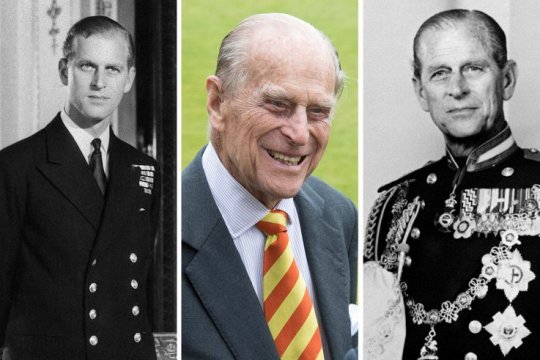
Contrary to what some might think I’m not really a fan girl when it comes to the royal family. I don’t religiously follow their every movement or utterance especially as I live in Paris and therefore I don’t really care about tabloid tittle tattle. I only get to hear of anything to do with the royal family when I speak to my parents or my great aunts and uncles for whom the subject is closer to their heart because of the services my family has rendered over past generations to the monarchy and the older (and dying) tight knit social circles they travel in.
Like Walter Bagehot, I’m more interested in the monarchy as an institution and its constitutional place within the historical, social, and political fabric of Britain and its continued delicate stabilising importance to that effect. It was Walter Bagehot, the great constitutional scholar and editor the Economist magazine, who said, “The mystic reverence, the religious allegiance, which are essential to a true monarchy, are imaginative sentiments that no legislature can manufacture in any people.” In his view, a politically-inactive monarchy served the best interests of the United Kingdom; by abstaining from direct rule, the monarch levitated above the political fray with dignity, and remained a respected personage to whom all subjects could look to as a guiding light.
Even as a staunch monarchist I freely confess that there has always been this odd nature of the relationship between hereditary monarchy and a society increasingly ambivalent about the institution. To paraphrase Bagehot again, there has been too much ‘daylight’ shone onto the ‘magic’ of the monarchy because we are obsessed with personalities as celebrities.
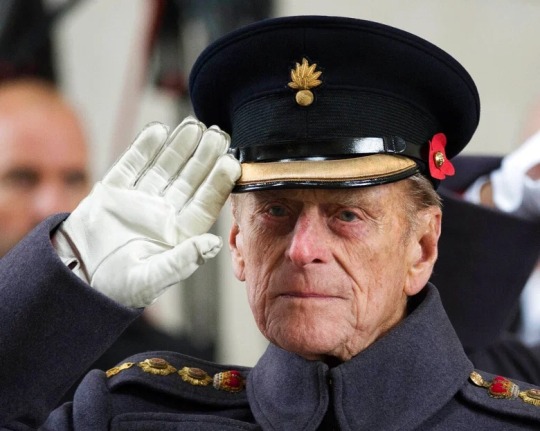
Having said that I did feel saddened by the passing of Prince Philip, the Duke of Edinburgh. After the Queen, he was my favourite royal. Anne, Princess Royal, would come next because she is very much like her father in temperament, humour, and character, so unlike her other brothers.
I have met the late Prince Philip when I was serving in the army in a few regimental meet-and-greet situations - which as you may know is pretty normal given that members of the royal family serve as honorary colonel-in-chiefs (patrons in effect) of all the British army regiments and corps.I also saw him at one or two social events such the annual charitable Royal Caledonian Ball (he’s an expert scottish reeler) and the Guards Polo Club where my older brothers played.
I’ll will freely confess that he was the one royal I could come close to identify with because his personal biography resonated with me a great deal.
Let’s be honest, the core Windsor family members, born to privilege, are conditioned and raised to be dull. Perhaps that’s a a tad harsh. I would prefer the term ‘anonymously self-effacing’, just another way of saying ‘for God’s sake don’t draw attention to yourself by saying or doing anything even mildly scandalous or political lest it invites public opprobrium and scrutiny’. The Queen magnificently succeeds in this but the others from Charles down just haven’t (with the exception of Princess Anne).
However, many people forget this obvious fact that it’s the incoming husbands and wives who marry into the Windsor family who are relied upon to bring colour and even liven things up a little. And long before Kate Middleton, Meghan Markle (very briefly), or Lady Diana Spencer, were the stars of ‘The Firm’- a phrase first coined by King George VI, Queen Elizabeth II's father who ruled from 1936 to 1952, who was thought to have wryly said, "British royals are 'not a family, we're a firm,” - it was Prince Philip who really livened things up and made the greater impact on the monarchy than any of them in the long term.
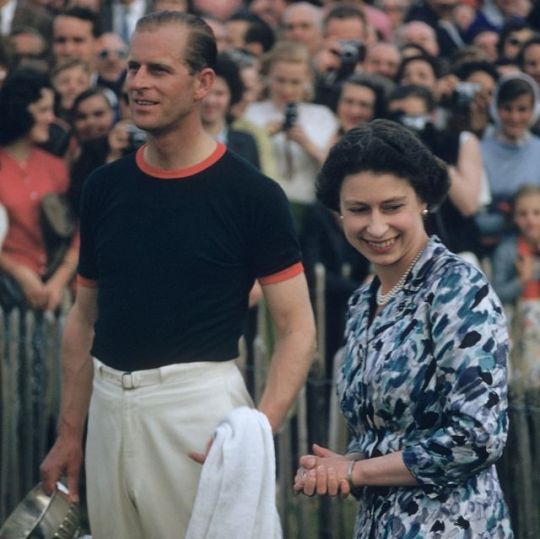
Prince Philip’s passing belied the truth of a far more complex individual: a destitute and penniless refugee Greek-Danish prince with a heart breaking backstory that could have been penned by any 19th Century novelist, and also eagle eyed reformer who tried to drag the royal family into the 20th century. At the core of the man - lost scion of a lost European royal dynasty, a courageous war veteran, and Queen’s consort - were values in which he attempted to transform and yet maintain much older inherited traditions and attitudes. Due to his great longevity, Philip’s life came to span a period of social change that is almost unprecedented, and almost no one in history viewed such a transformation from the front row.
Prince Philip would seem to represent in an acute form the best of the values of that era, which in many ways jar with today’s. He had fought with great courage in the war as a dashing young naval officer; he was regularly rude to foreigners, which was obviously a bonus to all Brits. He liked to ride and sail and shoot things. He was unsentimental almost to a comic degree, which felt reassuring at a time when a new-found emotional incontinence made many feel uncomfortable. Outrageous to some but endearing to others, he was the sort of man you’d want to go for a pint with, perhaps the ultimate compliment that an Englishman can pay to another Englishman. This has its own delicious irony as he wasn’t really an Englishman.
There are 4 takeways I would suggest in my appraisal of Prince Philip that stand out for me. So let me go through each one.
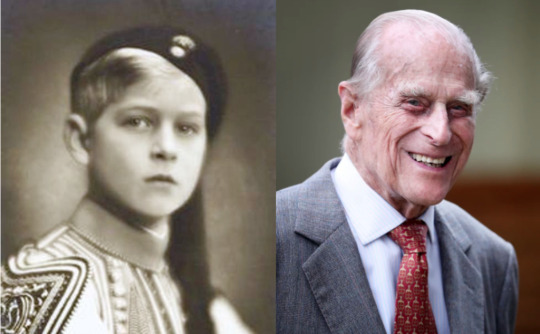
1. Prince Philip’s Internationalism
It may seem odd for me to say that Prince Philip wasn’t English but he wasn’t an Englishman in any real sense. He was a wretch of the world - stateless, homeless, and penniless. That the Prince of Nowhere became the British Monarchy’s figurehead was more than fitting for a great age of migration and transition in which the Royal Family survived and even flourished. That he was able to transform himself into the quintessential Englishman is testimony not just to his personal determination but also to the powerful cultural pull of Britishness.
He was born on a kitchen table in Corfu in June 1921. A year later in 1922, Philip, as the the great-great-grandson of Queen Victoria and nephew of Constantine I of Greece, was forced to flee with his family after the abdication of Constantine. He grew up outside Paris speaking French; ethnically he was mostly German although he considered himself Danish, his family originating from the Schleswig border region. He was in effect, despite his demeanour of Royal Navy officer briskness, a citizen of nowhere in an age of movement. From a very young age he was a stateless person, nationally homeless. Indeed, Philip was an outsider in a way that even Meghan Markle could never be; at his wedding in 1947, his three surviving sisters and two brothers-in-law were not permitted to attend because they were literally Britain’s enemies, having fought for the Germans. A third brother-in-law had even been in the SS, working directly for Himmler, but had been killed in the conflict.
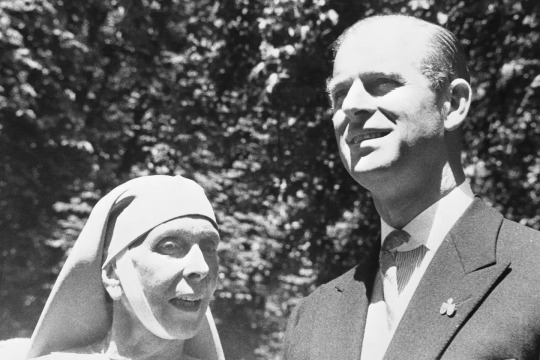
Even his religion was slightly exotic. He was Greek Orthodox until he converted to Anglicanism on marrying Elizabeth - what with his wife due to become supreme head of the Church and everything - but his ties with eastern Christianity remained. His great-aunts Princess Elisabeth of Hesse and by Rhine and Tsarina Alexandra are both martyrs of the Russian Orthodox Church, having been murdered by the Bolsheviks; Philip’s mother went on to become an Orthodox nun and a “Righteous Among the Nations” for saving a Jewish family during the Nazi occupation of Greece, spending much of her time in squalid poverty.
His parents were part of the largely German extended aristocracy who ruled almost all of Europe before it all came crashing down in 1918. When he died, aged 99, it marked a near-century in which all the great ideological struggles had been and gone; he had been born before the Soviet Union but outlived the Cold War, the War on Terror and - almost - Covid-19.
The world that Philip was born into was a far more violent and dangerous place than ours. In the year he was born, Irish rebels were still fighting Black and Tans; over the course of 12 months the Spanish and Japanese prime ministers were assassinated, there was a coup in Portugal and race riots in the United States. Germany was rocked by violence from the far-Left and far-Right, while in Italy a brutal new political movement, the Fascists, secured 30 seats in parliament, led by a trashy journalist called Benito Mussolini.
The worst violence, however, took place in Greece and Turkey. Following the defeat of the Ottoman Empire, what remained of Turkey was marked for permanent enfeeblement by the Allies. But much to everyone’s surprise the country’s force were roused by the brilliant officer Mustafa Kemal, who led the Turks to victory. Constantinople was lost to Christendom for good and thousands of years of Hellenic culture was put to the flames in Smyrna.
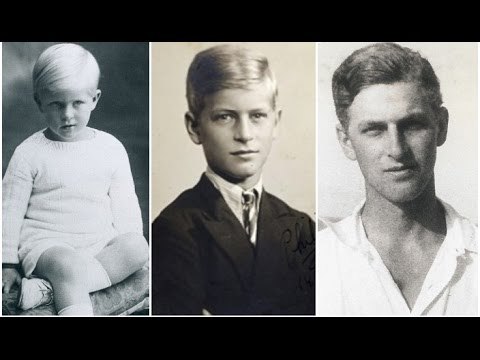
The Greek royal family, north German imports shipped in during the 19th century, bore much of the popular anger for this disaster. King Constantine fled to Italy, and his brother Andrew was arrested and only escaped execution through the intervention of his relative Britain’s George V. Andrew’s wife Alice, their four daughters and infant son Philip fled to France, completely impoverished but with the one possession that ensures that aristocrats are never truly poor: connections.
Philip had a traumatic childhood. He was forged by the turmoil of his first decade and then moulded by his schooling. His early years were spent wandering, as his place of birth ejected him, his family disintegrated and he moved from country to country, none of them ever his own. When he was just a year old, he and his family were scooped up by a British destroyer from his home on the Greek island of Corfu after his father had been condemned to death. They were deposited in Italy. One of Philip's first international journeys was spent crawling around on the floor of the train from an Italian port city, "the grubby child on the desolate train pulling out of the Brindisi night," as his older sister Sophia later described it.
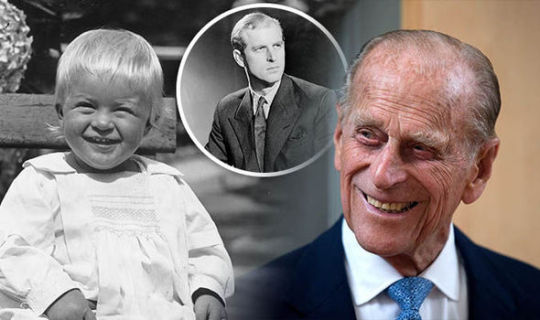
In Paris, he lived in a house borrowed from a relative; but it was not destined to become a home. In just one year, while he was at boarding school in Britain, the mental health of his mother, Princess Alice, deteriorated and she went into an asylum; his father, Prince Andrew, went off to Monte Carlo to live with his mistress. "I don't think anybody thinks I had a father," he once said. Andrew would die during the war. Philip went to Monte Carlo to pick up his father's possessions after the Germans had been driven from France; there was almost nothing left, just a couple of clothes brushes and some cuff-links.
Philip’s four sisters were all much older, and were soon all married to German aristocrats (the youngest would soon die in an aeroplane crash, along with her husband and children). His sisters became ever more embroiled in the German regime. In Scotland going to Gordonstoun boarding school, Philip went the opposite direction, becoming ever more British. Following the death of his sister Cecilie in a plane crash in 1937, the gulf widened. As the clouds of conflict gathered, the family simply disintegrated. With a flash of the flinty stoicism that many would later interpret, with no little justification, as self-reliance to the point of dispassion, the prince explained: “It’s simply what happened. The family broke up… I just had to get on with it. You do. One does.”
In the space of 10 years he had gone from a prince of Greece to a wandering, homeless, and virtually penniless boy with no-one to care for him. He got through it by making a joke of everything, and by being practical.
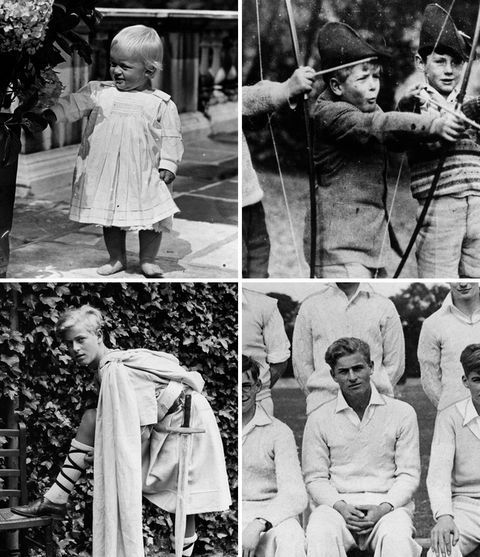
By the time he went to Gordonstoun, a private boarding school on the north coast of Scotland, Philip was tough, independent and able to fend for himself; he'd had to be. Gordonstoun would channel those traits into the school's distinct philosophy of community service, teamwork, responsibility and respect for the individual. And it sparked one of the great passions of Philip's life - his love of the sea. It was Gordonstoun that nurtured that love through the maturation of his character.
Philip adored the school as much as his son Charles would despise it. Not just because the stress it put on physical as well as mental excellence - he was a great sportsman. But because of its ethos, laid down by its founder Kurt Hahn, a Jewish exile from Nazi Germany.
Hahn first met Philip as a boy in Nazi Germany. Through a connection via one of his sister’s husbands, Philip, the poor, lonely boy was first sent off to a new school - in Nazi Germany. Which was as fun as can be imagined. Schloss Salem had been co-founded by stern educator called Kurt Hahn, a tough, discipline-obsessed conservative nationalist who saw civilisation in inexorable decline. But by this stage Hahn, persecuted for being Jewish in Nazi Germany, had fled to Britain, and Philip did not spend long at the school either, where pressure from the authorities was already making things difficult for the teachers. Philip laughed at the Nazis at first, because their salute was the same gesture the boys at his previous school had to make when they wanted to go to the toilet, but within a year he was back in England, a refugee once again.
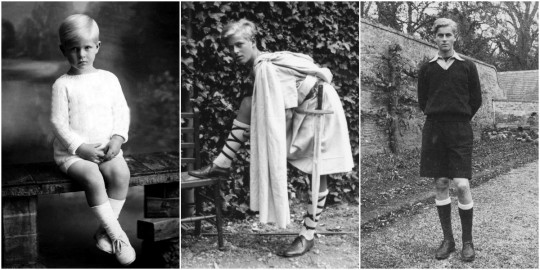
Philip happily attended Hahn’s new school, Gordonstoun, which the strict disciplinarian had set up in the Scottish Highlands. Inspired by Ancient Sparta, the boys (and then later girls) had to run around barefoot and endure cold showers, even in winter, the whole aim of which was to drive away the inevitable civilisational decay Hahn saw all around him. To 21st century ears it sounds like hell on earth, yet Philip enjoyed it, illustrating just what a totally alien world he came from.
That ethos became a significant, perhaps the significant, part of the way that Philip believed life should be lived. It shines through the speeches he gave later in his life. "The essence of freedom," he would say in Ghana in 1958, "is discipline and self-control." The comforts of the post-war era, he told the British Schools Exploring Society a year earlier, may be important "but it is much more important that the human spirit should not be stifled by easy living". And two years before that, he spoke to the boys of Ipswich School of the moral as well as material imperatives of life, with the "importance of the individual" as the "guiding principle of our society".
It was at Gordonstoun one of the great contradictions of Philip's fascinating life was born. The importance of the individual was what in Kurt Hahn's eyes differentiated Britain and liberal democracies from the kind of totalitarian dictatorship that he had fled. Philip put that centrality of the individual, and individual agency - the ability we have as humans to make our own moral and ethical decisions - at the heart of his philosophy.
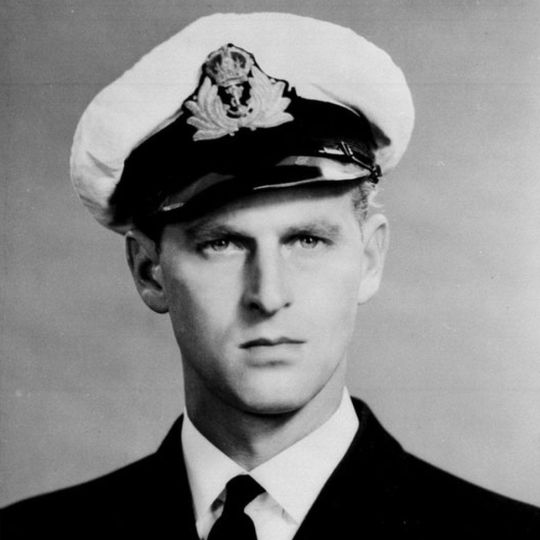
At Dartmouth Naval College in 1939, the two great passions of his life would collide. He had learned to sail at Gordonstoun; he would learn to lead at Dartmouth. And his driving desire to achieve, and to win, would shine through. Despite entering the college far later than most other cadets, he would graduate top of his class in 1940. In further training at Portsmouth, he gained the top grade in four out of five sections of the exam. He became one of the youngest first lieutenants in the Royal Navy.
The navy ran deep in his family. His maternal grandfather had been the First Sea Lord, the commander of the Royal Navy; his uncle, "Dickie" Mountbatten, had command of a destroyer while Philip was in training. In war, he showed not only bravery but guile. It was his natural milieu. "Prince Philip", wrote Gordonstoun headmaster Kurt Hahn admiringly, "will make his mark in any profession where he will have to prove himself in a trial of strength".
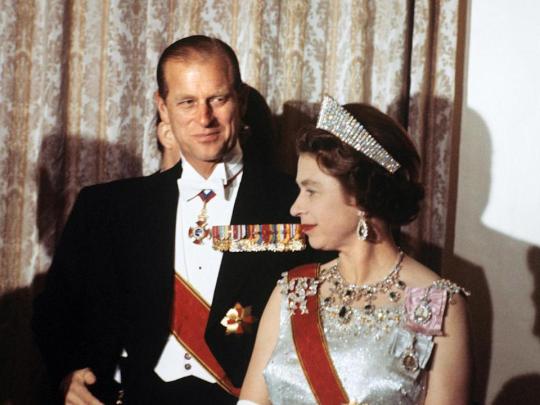
2. Prince Philip and the modernisation of the monarchy
In his own words, the process of defining what it meant to be a royal consort was one of “trial and error.” Speaking with BBC One’s Fiona Bruce in 2011, Philip explained, “There was no precedent. If I asked somebody, 'What do you expect me to do?' they all looked blank. They had no bloody idea, nobody had much idea.” So he forged for himself a role as a moderniser of the monarchy.
He could not have had much idea back in 1939. Back then in Dartmouth in 1939, as war became ever more certain, the navy was his destiny. He had fallen in love with the sea itself. "It is an extraordinary master or mistress," he would say later, "it has such extraordinary moods." But a rival to the sea would come.
When King George VI toured Dartmouth Naval College, accompanied by Philip's uncle, he brought with him his daughter, Princess Elizabeth. Philip was asked to look after her. He showed off to her, vaulting the nets of the tennis court in the grounds of the college. He was confident, outgoing, strikingly handsome, of royal blood if without a throne. She was beautiful, a little sheltered, a little serious, and very smitten by Philip.
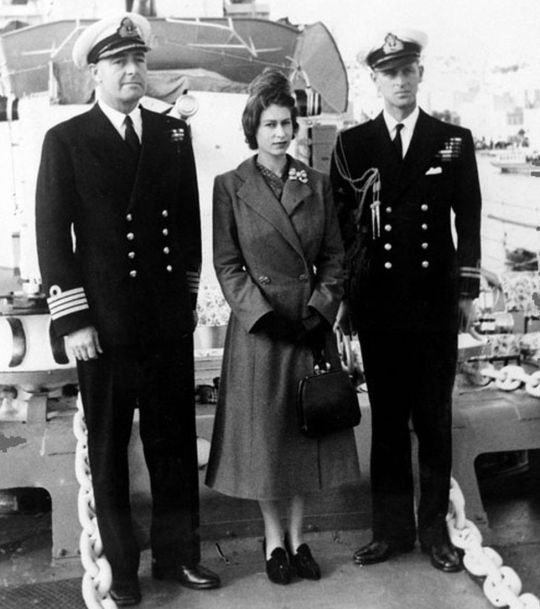
Did he know then that this was a collision of two great passions? That he could not have the sea and the beautiful young woman? For a time after their wedding in 1948, he did have both. As young newlyweds in Malta, he had what he so prized - command of a ship - and they had two idyllic years together. But the illness and then early death of King George VI brought it all to an end.
He knew what it meant, the moment he was told. Up in a lodge in Kenya, touring Africa, with Princess Elizabeth in place of the King, Philip was told first of the monarch's death in February 1952. He looked, said his equerry Mike Parker, "as if a ton of bricks had fallen on him". For some time he sat, slumped in a chair, a newspaper covering his head and chest. His princess had become the Queen. His world had changed irrevocably.
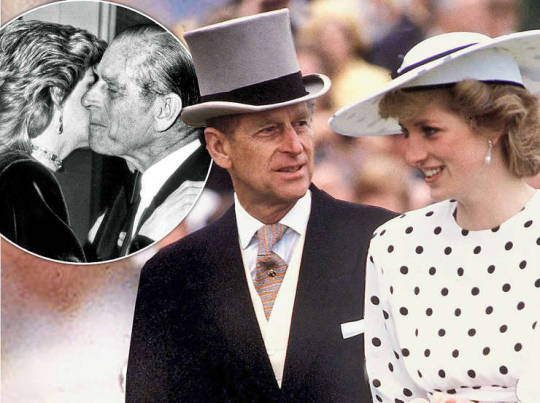
While the late Princess Diana was later to famously claim that there were “three people” in her marriage - herself, Prince Charles and Camilla - there were at least 55 million in Philip and Elizabeth’s. As Elizabeth dedicated her life to her people at Westminster Abbey at the Coronation on June 2, 1953, it sparked something of an existential crisis in Philip. Many people even after his death have never really understood this pivotal moment in Philip’s life. All his dreams of being a naval officer and a life at sea as well as being the primary provider and partner in his marriage were now sacrificed on the altar of duty and love.
With his career was now over, and he was now destined to become the spare part. Philip, very reasonably, asked that his future children and indeed his family be known by his name, Mountbatten. In effect he was asking to change the royal family’s name from the House of Windsor to the House of Mountbatten. But when Prime Minister Winston Churchill got wind of it as well as the more politically agile courtiers behind the Queen, a prolonged battle of wits ensued, and it was one Philip ultimately lost. It was only in 1957 that he accepted the title of “Prince.”
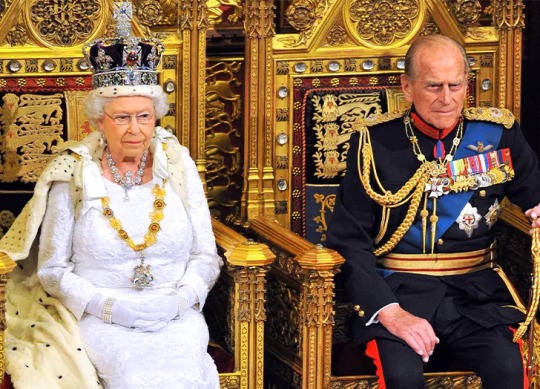
Even though he had almost lost everything dear to him and his role now undefined, he didn’t throw himself a pity party. He just got on with it. Philip tried to forge his own distinct role as second fiddle to the woman who had come to represent Great Britain. He designated himself the First Officer of the Good Ship Windsor. He set about dusting off some of the cobwebs off the throne and letting some daylight unto the workings of the monarchy by advocating reasonable amount of modernisation of the monarchy.
He had ideas about modernising the royal family that might be called “improving optics” today. But in his heart of hearts he didn’t want the monarchy to become a stuffy museum piece. He envisaged a less stuffy and more popular monarchy, relevant to the lives of ordinary people. Progress was always going to be incremental as he had sturdy opposition from the old guard who wanted to keep everything as it was, but nevertheless his stubborn energy resulted in significant changes.
When a commission chaired by Prince Philip proposed broadcasting the 1953 investiture ceremony that formally named Elizabeth II as queen on live television, Prime Minister Winston Churchill reacted with outright horror, declaring, “It would be unfitting that the whole ceremony should be presented as if it were a theatrical performance.” Though the queen had initially voiced similar concerns, she eventually came around to the idea, allowing the broadcast of all but one segment of the coronation. Ultimately, according to the BBC, more than 20 million people tuned in to the televised ceremony - a credit to the foresight of Philip.
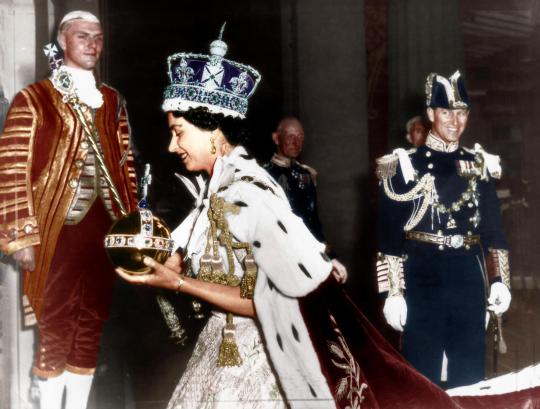
Elizabeth’s coronation marked a watershed moment for a monarchy that has, historically, been very hands off, old-fashioned and slightly invisible. Over the following years, the royals continued to embrace television as a way of connecting with the British people: In 1957, the queen delivered her annual Christmas address during a live broadcast. Again, this was Philip’s doing when he cajoled the Queen to televise her message live. He even helped her in how to use the teleprompter to get over her nerves and be herself on screen.
Four years later, in 1961, Philip became the first family member to sit for a television interview. It is hard for us to imagine now but back then it was huge. For many it was a significant step in modernising the monarchy.
Though not everything went to plan. Toward the end of the decade, the Windsors even invited cameras into their home. A 1969 BBC fly-on-the-wall documentary, instigated by Philip to show life behind the scenes, turned into an unmitigated disaster: “The Windsors” revealed the royals to be a fairly normal, if very rich, British upper-class family who liked barbecues, ice cream, watching television and bickering. The mystery of royalty took a hit below the waterline from their own torpedo, a self-inflicted wound from which they took a long time to recover. Shown once, the documentary was never aired again. But it had an irreversible effect, and not just by revealing the royals to be ordinary. By allowing the cameras in, Philip opened the lid to the prying eyes of the paparazzi who could legitimately argue that since the Royals themselves had sanctioned exposure, anything went. From then on, minor members of the House of Windsor were picked off by the press, like helpless tethered animals on a hunting safari.
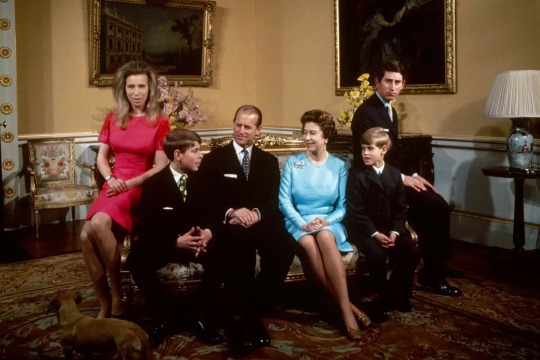
Prince Philip also took steps to reorganise and renovate the royal estates in Sandringham and Balmoral such as intercoms, modern dish washers, generally sought to make the royal household and the monarchy less stuffy, not to have so much formality everywhere.
Philip helped modernised the monarchy in other ways to acknowledge that the monarchy could be responsive to changes in society. It was Prince Philip - much to the chagrin of the haughty Princess Margaret and other stuffy old courtiers - who persuaded the Queen to host informal lunches and garden parties designed to engage a broader swath of the British public. Conversely, Prince Philip heartily encouraged the Queen (she was all for it apparently but was still finding her feet as a new monarch) to end the traditional practice of presenting debutantes from aristocratic backgrounds at court in 1952. For Philip and others it felt antiquated and out of touch with society. I know in speaking to my grandmother and others in her generation the decision was received with disbelief at how this foreign penniless upstart could come and stomp on the dreams of mothers left to clutch their pearls at the prospect there would be no shop window for their daughter to attract a suitable gentleman for marriage. One of my great aunts was over the moon happy that she never would have to go through what she saw as a very silly ceremony because she preferred her muddy wellies to high heels.
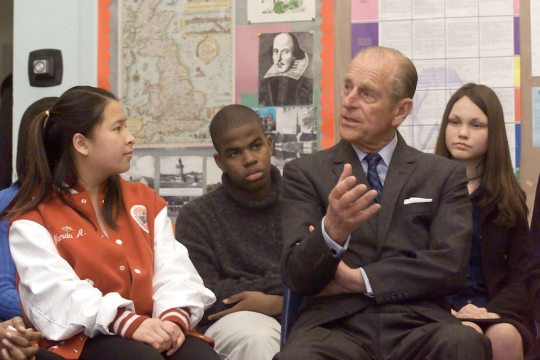
A former senior member of the royal household, who spent several years working as one of Prince Philip’s aides, and an old family friend, once told us around a family dinner table that the Duke of Edinburgh was undoubtedly given a sense of permanence by his marriage into the Royal Family that was missing from earlier years. But the royal aide would hastily add that Prince Philip, of course, would never see it that way.
Prince Philip’s attitude was to never brood on things or seek excuses. And he did indeed get on with the job in his own way - there should be no doubt that when it came to building and strengthening the Royal Family it was a partnership of equals with the Queen. Indeed contrary to Netflix’s hugely popular series ‘The Crown’ and its depiction of the royal marriage with Philip’s resentment at playing second fiddle, the prince recognised that his “first duty was to serve the Queen in the best way I could,” as he told ITV in 2011. Though this role was somewhat ill-suited to his dynamic, driven, and outspoken temperament, Philip performed it with utter devotion.
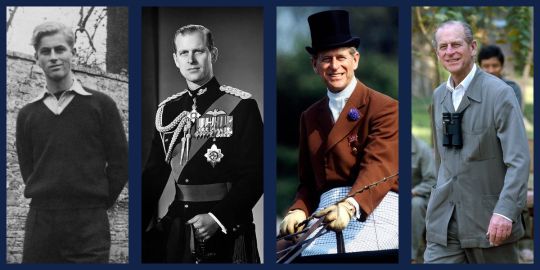
3. Prince Philip’s legacy
One could argue rightly that modernising the monarchy was his lasting legacy achievement. But he also tried to modernise a spent and exhausted Britain as it emerged from a ruinous war. When peace came, and with it eventual economic recovery, Philip would throw himself into the construction of a better Britain, urging the country to adopt scientific methods, embracing the ideas of industrial design, planning, education and training. A decade before Harold Wilson talked of the "white heat of the technological revolution", Philip was urging modernity on the nation in speeches and interviews. He was on top of his reading of the latest scientific breakthroughs and well read in break out innovations.
This interest in modernisation was only matched by his love for nature. As the country and the world became richer and consumed ever more, Philip warned of the impact on the environment, well before it was even vaguely fashionable. As president of the World Wildlife Fund (WWF) in the UK for more than 20 years from 1961, he was one of the first high-profile advocates of the cause of conservation and biological diversity at a time when it was considered the preserve of an eccentric few.
For a generation of school children in Britain and the Commonwealth though, his most lasting legacy and achievement will be the Duke of Edinburgh Awards (DofE). He set up the Duke of Edinburgh award, a scheme aimed at getting young people out into nature in search of adventure or be of service to their communities. It was a scheme that could match the legacy of Baden Powell’s scouts movement.
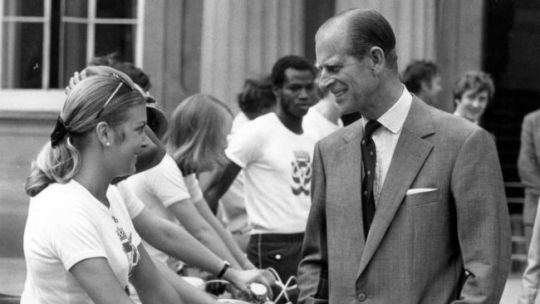
When Prince Philip first outlined his idea of a scheme to harness the values of his education at Gordonstoun by bringing character-building outdoor pursuits to the many rather than the fee-paying few, he received short shrift from the government of the day. The then minister of education, Sir David Eccles responded to the Duke’s proposal by saying: “I hear you’re trying to invent something like the Hitler Youth.” Undeterred he pushed on until it came to fruition.
I’m so glad that he did. I remember how proud I was for getting my DofE Awards while I was at boarding school. With the support of great mentors I managed to achieve my goals: collecting second-hand English books for a literacy programme for orphaned street children in Delhi, India with a close Indian school friend and her family; and completing a 350 mile hike following St. Olav’s Pilgrimmage Trail from Selånger, on the east coast of Sweden, and ending at Nidaros Cathedral in Trondheim, on the west coast of Norway.
It continues to be an enduring legacy. Since its launch in 1956, the Duke of Edinburgh awards have been bestowed upon some 2.5 million youngsters in Britain and some eight million worldwide. For a man who once referred to himself as a “Greek princeling of no consequence”, his pioneering tutelage of these two organisations (alongside some 778 other organisations of which he was either president or a patron) would be sufficient legacy for most.
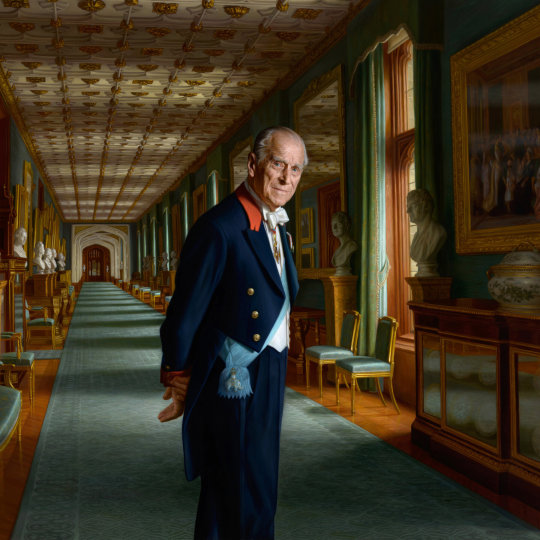
4. Prince Philip’s character
It may surprise some but what I liked most about Prince Philip was the very thing that helped him achieve so much and leave a lasting legacy: his character.
It is unhelpful to the caricature of Prince Philip as an unwavering but pugnacious consort whose chief talent was a dizzying facility in off-colour one-liners that he was widely read and probably the cleverest member of his family.
His private library at Windsor consists of 11,000 tomes, among them 200 volumes of poetry. He was a fan of Jung, TS Eliot, Shakespeare and the cookery writer Elizabeth David. As well as a lifelong fascination with science, technology and sport, he spoke fairly fluent French, painted and wrote a well received book on birds. It’s maddening to think how many underestimated his genuine intellect and how cultured he was behind the crusty exterior.
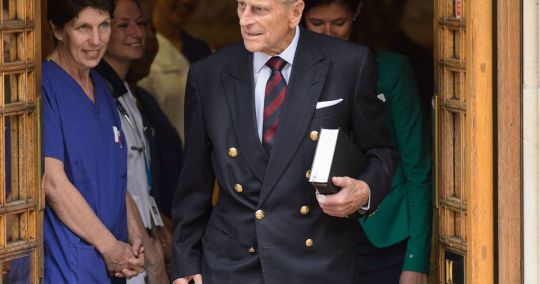
He didn’t have an entourage to fawn around him. He was the first to own a computer at Buckingham Palace. He answered his own phone and wrote and responded to his own correspondence. By force of character he fought the old guard courtiers at every turn to modernise the monarchy against their stubborn resistance.
Prince Philip was never given to self-analysis or reflection on the past. Various television interviewers tried without success to coerce him in to commenting on his legacy.But once when his guard was down he asked on the occasion of his 90th birthday what he was more proud of, he replied with characteristic bluntness: “I couldn’t care less. Who cares what I think about it, I mean it’s ridiculous.”
All of which neatly raises the profound aversion to fuss and the proclivity for tetchiness often expressed in withering put-downs that, for better or worse, will be the reflex memory for many of the Duke of Edinburgh. If character is a two edged sword so what of his gaffes?
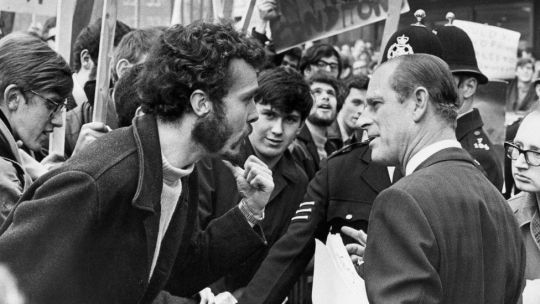
There is no doubt his cult status partly owed to his so-called legendary gaffes, of which there are enough to fill a book (indeed there is a book). But he was no racist. None of the Commonwealth people or foreign heads of state ever said this about him. Only leftist republicans with too much Twitter time on their hands screamed such a ridiculous accusation. They’re just overly sensitive snowflakes and being devoid of any humour they’re easily triggered.
There was the time that Philip accepted a gift from a local in Kenya, telling her she was a kind woman, and then adding: “You are a woman, aren’t you?” Or the occasion he remarked “You managed not to get eaten, then?” to a student trekking in Papua New Guinea. Then there was his World Wildlife Fund speech in 1986, when he said: “If it has got four legs and it is not a chair, if it has got two wings and it flies but is not an aeroplane, and if it swims and it is not a submarine, the Cantonese will eat it.” Well, he wasn’t wrong.
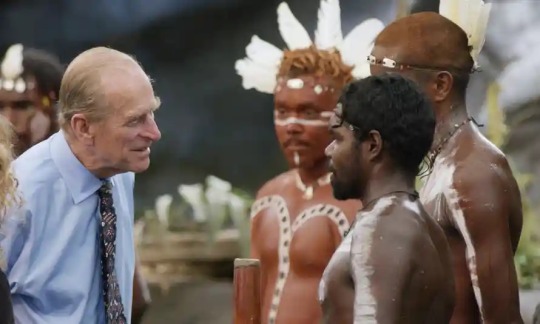
Philip quickly developed a reputation for what he once defined, to the General Dental Council, as “dentopedology – the science of opening your mouth and putting your foot in it”. Clearly he could laugh at himself as he often did as an ice breaker to put others at ease.
His remarking to the president of Nigeria, who was wearing national dress, “You look like you’re ready for bed”, or advising British students in China not to stay too long or they would end up with “slitty eyes”, is probably best written off as ill-judged humour. Telling a photographer to “just take the fucking picture” or declaring “this thing open, whatever it is”, were expressions of exasperation or weariness with which anyone might sympathise.
Above all, he was also capable of genuine if earthy wit, saying of his horse-loving daughter Princess Anne: “If it doesn’t fart or eat hay she isn’t interested.” Many people might have thought it but few dared say it. If Prince Philip’s famous gaffes provoked as much amusement as anger, it was precisely because they seem to give voice to the bewilderment and pent-up frustrations with which many people viewed the ever-changing modern world.
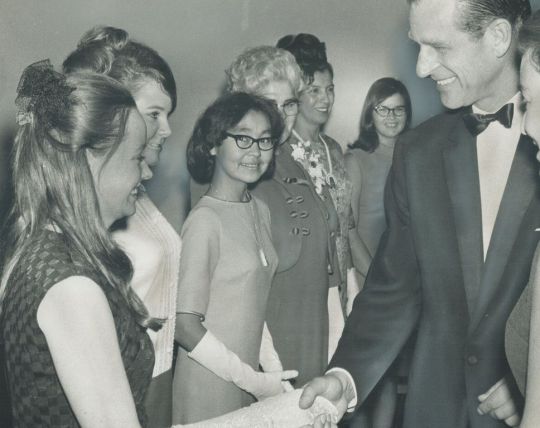
A former royal protection officer recounts how while on night duty guarding a visiting Queen and consort, he engaged in conversation with colleagues on a passing patrol. It was 2am and the officer had understood the royal couple to be staying elsewhere in the building until a window above his head was abruptly slammed open and an irate Prince Philip stuck his head out of the window to shout: “Would you fuck off!” Without another word, he then shut the window.
The Duke at least recognised from an early age that he was possessed of an abruptness that could all too easily cross the line from the refreshingly salty to crass effrontery.
One of his most perceptive biographers, Philip Eade, recounted how at the age of 21 the prince wrote a letter to a relation whose son had recently been killed in combat. He wrote: “I know you will never think much of me. I am rude and unmannerly and I say things out of turn which I realise afterwards must have hurt someone. Then I am filled with remorse and I try to put matters right.”
In the case of the royal protection officer, the Duke turned up in the room used by the police officers when off duty and said: “Terribly sorry about last night, wasn’t quite feeling myself.”
Aides have also ventured to explain away some of their employer’s more outlandish remarks - from asking Cayman islanders “You are descended from pirates aren’t you?” to enquiring of a female fashion writer if she was wearing mink knickers - as the price of his instinctive desire to prick the pomposity of his presence with a quip to put others at ease.
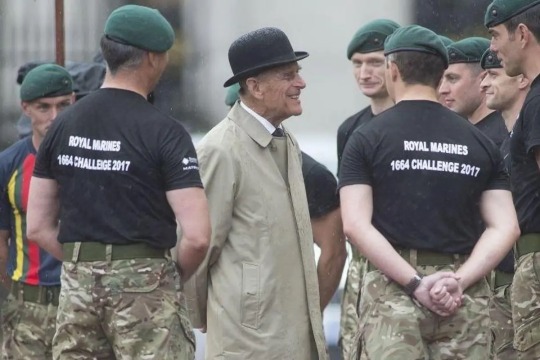
Indeed many people forget that his ‘gaffes’ were more typical of the clubbish humour of the British officer class – which of course would be less appreciated, sometimes even offensive, to other ears. It’s why he could relate so well to veterans who enjoyed his bonhomie company immensely.
But behind the irascibility, some have argued there also lay a darker nature, unpleasantly distilled in his flinty attitude to his eldest son. One anecdote tells of how, in the aftermath of the murder of the Duke’s uncle and surrogate father, Lord Mountbatten, Philip lectured his son, who was also extremely fond of his “honorary grandfather”, that he was not to succumb to self-pity. Charles left the room in tears and when his father was asked why he had spoken to his son with so little compassion, the Duke replied: “Because if there’s any crying to be done I want it to happen within this house, in front of his family, not in public. He must be toughened up, right now.”
But here I would say that Prince Philip’s intentions were almost always sincere and in no way cruel. He has always tried to protect his family - even from their own worst selves or from those outside the family ‘firm’ who may not have their best interest at heart.
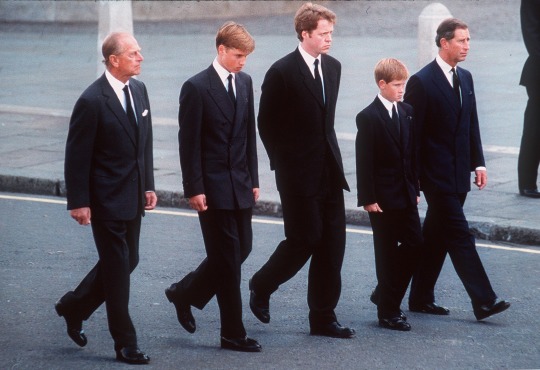
In 1937, a 16-year-old Prince Philip had walked behind his elder sister Cecile’s coffin after she was killed in a plane crash while heavily pregnant. The remains of newly-born infant found in the wreckage suggested the aircraft had perished as the pilot sought to make an emergency landing in fog as the mother entered childbirth. It was an excruciating taste of tragedy which would one day manifest itself in a very princely form of kindness that was deep down that defined Philip’s character.
When about 60 years later Prime Minister Tony Blair’s spin doctors in Downing Street tried to strong arm the Queen and the royal household over the the arrangements for the late Prince Diana’s funeral, it was Philip who stepped in front to protect his family. The Prime Minister and his media savvy spin doctors wanted the two young princes, William and Harry, to walk behind the coffin.
The infamous exchange was on the phone during a conference call between London and Balmoral, and the emotional Philip was reportedly backed by the Queen. The call was witnessed by Anji Hunter, who worked for Mr Blair. She said how surprised she was to hear Prince Philip’s emotion. ‘It’s about the boys,” he cried, “They’ve lost their mother”. Hunter thought to herself, “My God, there’s a bit of suffering going on up there”.’
Sky TV political commentator Adam Boulton (Anji Hunter’s husband) would write in his book Tony’s Ten Years: ‘The Queen relished the moment when Philip bellowed over the speakerphone from Balmoral, “Fuck off. We are talking about two boys who have just lost their mother”. Boulton goes on to say that Philip: ‘…was trying to remind everyone that human feelings were involved. No 10 were trying to help the Royals present things in the best way, but may have seemed insensitive.’
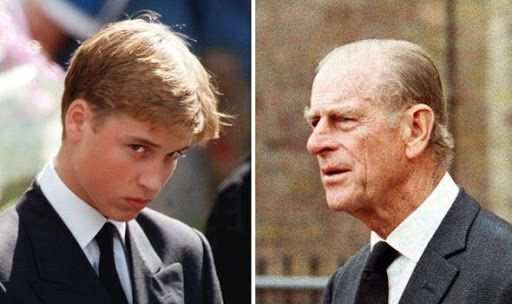
In the end the politicians almost didn’t get their way. Prince Philip stepped in to counsel his grandson, Prince William, after he had expressed a reluctance to follow his mother’s coffin after her death in Paris. Philip told the grieving child: “If you don’t walk, I think you’ll regret it later. If I walk, will you walk with me?”
It’s no wonder he was sought as a counsellor by other senior royals and especially close to his grandchildren, for whom he was a firm favourite. His relationship with Harry was said to have become strained, however, following the younger Prince’s decision to reject his royal inheritance for a life away from the public eye in America with his new American wife, Meghan Markle. For Prince Philip I am quite sure it went against all the elder Prince had lived his life by - self-sacrifice for the greater cause of royalty.
This is the key to Philip’s character and in understanding the man. The ingrained habits of a lifetime of duty and service in one form or another were never far away.
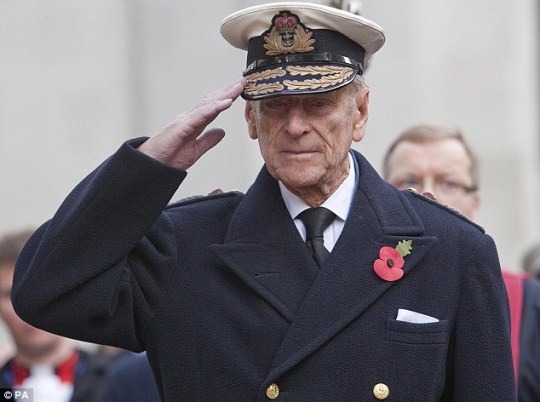
In conclusion then....
After more time passes I am sure historians will make a richer reassessment of Prince Philip’s life and legacy. Because Prince Philip was an extraordinary man who lived an extraordinary life; a life intimately connected with the sweeping changes of our turbulent 20th Century, a life of fascinating contrast and contradiction, of service and some degree of solitude. A complex, clever, eternally restless man that not even the suffocating protocols of royalty and tradition could bind him.
Although he fully accepted the limitations of public royal service, he did not see this as any reason for passive self-abnegation, but actively, if ironically, identified with his potentially undignified role. It is this bold and humorous embrace of fated restriction which many now find irksome: one is no longer supposed to mix public performance with private self-expression in quite this manner.
Yet such a mix is authentically Socratic: the proof that the doing of one’s duty can also be the way of self-fulfilment. The Duke’s sacrifice of career to romance and ceremonial office is all the more impressive for his not hiding some annoyance. The combination of his restless temperament and his deeply felt devotion to duty found fruitful expression; for instance, in the work of Saint George’s House Windsor - a centre and retreat that he created with Revd. Robin Woods - in exploring religious faith, philosophy, and contemporary issues.
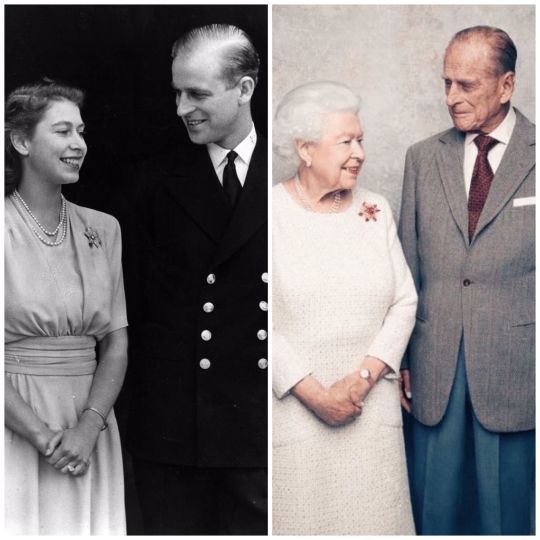
Above all he developed a way to be male that was both traditional and modern. He served one woman with chivalric devotion as his main task in life while fulfilling his public engagements in a bold and active spirit. He eventually embraced the opportunity to read and contemplate more. And yet, he remained loyal to the imperatives of his mentor Kurt Hahn in seeking to combine imagination with action and religious devotion with practical involvement.
Prince Philip took more pride in the roles he had accidentally inherited than in the personal gifts which he was never able fully to develop. He put companionship before self-realisation and acceptance of a sacred symbolic destiny before the mere influencing of events. In all these respects he implicitly rebuked our prevailing meritocracy which over-values officially accredited attainment, and our prevailing narcissism which valorises the assertion of discrete identities.
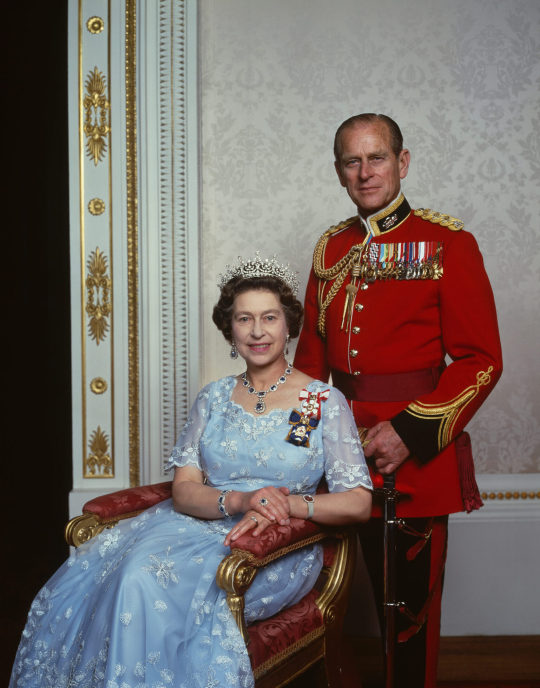
Prince Philip was Britain’s longest-serving consort. He was steadfast, duty driven, and a necessary adjunct to the continuity and stability of the Queen and the monarchy. Of all the institutions that have lost the faith of the British public in this period - the Church, Parliament, the media, the police - the Monarchy itself has surprisingly done better than most at surviving, curiously well-adapted to a period of societal change and moral anarchy. The House of Hanover and later Saxe-Coburg and Gotha (changed to Windsor), since their arrival in this country in 1714, have been noted above all for their ability to adapt. And just as they survived the Victorian age by transforming themselves into the bourgeoise, domestic ideal, so they have survived the new Elizabethan era (Harry-Meghan saga is just a passing blip like the Edward-Wallis Simpson saga of the 1930s).
There was once a time when the Royal’s German blood was a punchline for crude and xenophobic satirists. Now it is the royals who are deeply British while the country itself is increasingly cosmopolitan and globalised. British society has seen a greater demographic change than the preceding four or five thousand years combined, the second Elizabethan age has been characterised more than anything by a transformational movement of people. Prince Philip, the Greek-born, Danish-German persecuted and destitute wanderer who came to become one of the Greatest Britons of the past century, perhaps epitomised that era better than anyone else. And he got through it by making a joke of everything, and by being practical.
I hope I don’t exaggerate when I say that in our troubled times over identity, and our place and purpose in the world, we need to heed his selfless example more than ever.
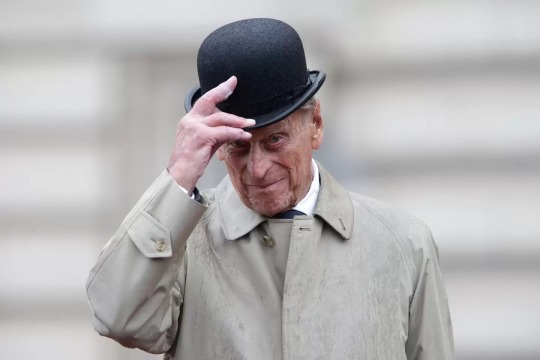
As Heraclitus wisely said, Ήθος ανθρώπω δαίμων (Character is destiny.)
RIP Prince Philip. You were my prince. God damn you, I miss you already.
Thanks for your question.
#question#ask#prince philip#duke of edinburgh#queen elizabeth II#the queen of spades#monarchy#britain#british#royalty#politics#history#culture#europe#crown#icon#great briton#society
284 notes
·
View notes
Text
The thing I keep trying to wrap my head around with this arc is who the Hell were they trying to market to? If you are bringing in Welsh content into the game, you have to have some endgoal, some idea of WHY, because it sticks out like a sore thumb compared to the rest.
I know Celticists aren’t the intended group, because we’re a small, small part of the population and, anyway, AC isn’t exactly designed for historians (though we’re NOT historians, at least not universally, most Celticists deal with literature and linguistics, but I digress.) I’m okay with that, I know that. Just about any Celtic media that we get is not going to be geared towards us, and we tend to be ultra-nitpicky because it’s the ONE THING that we can nitpick and we don’t get the chance to do it often.
Christians aren’t going to be happy because Valhalla is.....not a particularly Christianity-friendly game ANYWAY, and Tewdwr goes from a devout would-be monk to preaching about many gods, one god, living in harmony with the pagans, etc. Not the WORST of the game’s sins (that would probably go to the Anchoress quest and the general lack of positive Christian characters, with the exception of Deorlaf), but not GOOD.
Celtic Reconstructionists aren’t going to be happy because.............it’s wildly inaccurate, and Celtic Reconstructionists as a general group tend to put in the research to KNOW when something’s bullshit, or to at least have a “I don’t think that’s right.....” reaction. (Seriously, to my Celtic Reconstructionist followers, love you guys, you make it worth it to keep on posting about this sort of thing.)
Wiccans aren’t going to be happy because the major figure associated with the pre-Christian religion is evil and conducts human sacrifice. Also something tells me that, if you WANT to read it that way, a powerful female pagan figure (who wanted to institute a matrilineal leadership, with her daughter taking her place) being replaced by a Christian man wouldn’t exactly win over their hearts and minds. (And our protagonist helps the region to go from having a Goddess-Horned King pairing to having a single male figure ruling alone, which I’m pretty sure could be taken as being a metaphor for the loss of Goddess-based worship...which isn’t exactly historically on the nose, given how patriarchal the world of the pre-Christian Irish and Welsh was, but I seem to recall quite a few Wiccan articles around that topic back when I was first getting into the fray.)
Anyone who has an interest in Celtic stuff at all will be able to notice the Mari Lwyd being...........................at Samhain, instead of Christmas.
Welsh people aren’t going to be happy because it makes their language a joke while not even making Wales an explorable region.
And anyone who doesn’t really care about that stuff isn’t going to like it because it’s one more region, it isn’t particularly gripping or high action compared to some of the others, and it’s close enough to the endgame that you kind of just want to be anywhere else.
Like, every AC game begins with a disclaimer that people of multiple faiths and cultures worked together on this game, but something tells me that........none of them had any background in this sort of thing at all. And they didn’t bother to consult someone who would have known.
17 notes
·
View notes
Text
Ikevamp Suitors as University Professors (Part Two!)
Isaac
Physics Prof ofc with a love of Astronomy
When his class sees him for the first time at the beginning of the year, they usually think he’s another student
A graduate student at most
Imagine their shock when he starts leading the lecture oh boy
Arthur and Dazai love sitting in on the first day to hear all the gasps those little shits
Isaac’s students learn rEAL QUICK that despite looking super young, he shouldn’t be messed with
This boy is hELLA smart
Arthur makes it a point to visit often and persuade the class to prank poor ole Newt
But they actually respect him a lot sorry Arthur
Isaac is a way better teacher than he gives himself credit for
which is important because Physics...oH BOY
I had to learn some Newtonian Physics for an Astronomy class and I cRIED
Even though he seems aloof, he spends hours tutoring students after class/during office hours when they struggle to understand certain concepts
He’s got a hidden heart of gold that not many people get to see
He’s definitely one of those profs that students remember like 30 years after graduating
Lots of students take turns leaving an apple on his desk before every lecture
At the end of the year, they get him a huge barrel of apples and apple-themed decorations
He scowls, but he’s secretly endeared
Shut up Isaac you know you love it
Theo
An Art History prof!
Every first-year art student has to take both Vincent’s class and Theo’s class
After finding out that the two are brothers, most of them are excited to meet Theo since Vincent is such a sweetheart
only to meet the Devil incarnate
Theo doesn’t play around!
You will know the difference between Neo-Impressionism and Post-Impressionism and you will like it
The people that called this class a piece of cake are quaking as he goes through the syllabus
Although Theo seems scary and a lot like a prickly lil pineapple, it’s clear that he truly has a passion for art even tho he doesn’t make any of his own
But bc of this passion, he expects everyone to be perfect at all times
Sometimes Vincent will drop by and it’s like a breath of fresh air
Is Professor Theo...smiling??
As the semester goes on, he kinda grows on everyone
He does his best to make his lessons interesting so everyone can get as excited by art as he does
Actually says really wise things sometimes? albeit in a Theo-esque way
“Now listen here. All of you are artists with your own methods and none of you need to imitate these old styles if you don’t want to. All these painters are dead and even if they weren’t, they wouldn’t give a shit. In fact, the only people who did give a shit were the ones that could barely hold a brush and they’re dead now too, so fuck ‘em.”
Profound.
Dazai
Literature prof with a focus on Japanese works ofc
Also a major fixture in the Japanese branch of the Foreign Language department
He doesn’t teach the language, but he loves to teach the culture
Where Arthur probably teaches the 1st and 2nd years, Dazai teaches the 3rd and 4th years
Absolutely No One takes him seriously when they see him for the first time
Mainly bc he was lounging on the window sill as opposed to a chair
Yeah that’s right, his lecture hall has windows, as per his request
He’s a major wild card and spends most lectures walking across the desk at the front of the room
A major crackhead
Seriously, you’re never safe in his class
You never know when he might sneak up behind you and literally jumpscare you
“HeLLo AiKO-sAn~”
Super laidback, doesn’t like giving many assignments
“Instead of an essay, why don’t you all just walk through nature today and write a poem based on your experiences~”
Lots of students low-key think he smokes up before class but this has yet to be confirmed
Brings his bird to class everyday
Never
EVER
remembers names.
The kind of prof you either love or hate
BUT HOW COULD YOU HATE HIM
Jean
Our good Catholic boy has degrees in History and Religious Studies
He enjoys combining them by teaching classes on Religious History and the occasional World Religions class
Although he’s Christian, he enjoys hearing about other religions and is definitely not the type to debate which faith is ‘better’
buT OFC he gets rowdy students looking to start arguments from time to time
He listens patiently to all their points but DON’T FORGET that this man knows how to roast the ever living fuck out of someone if he needs to this is practically canon
It’s not a power he uses often but when he does.......those students regret ever starting that debate with him
With the exception of those poor victims, most students actually like him
Which surprises him to no end
Whenever students tell him how much they enjoyed having him as a teacher he’s like “eRRoR &$326872*&3&6″
Bc even though he’s p serious and stoic, he makes class interesting in his own unique way
He insists he isn’t that great and shouldn’t work as a prof but Napoleon is always there to go “HEY! THEY LOVE YOU!”
Plus quite a few girls think the emo hair is a LOOK
#Ikemen vampire#ikevam#ikevamp#isaac newton#theo van gogh#osamu dazai#jean d'arc#ikevamp isaac#ikevamp theo#ikevamp dazai#ikevamp jean#jeanne d'arc#ikevamp jeanne#theodorus van gogh#ikevamp theodorus#ikevamp headcanons
158 notes
·
View notes
Note
Genuinely asking here bc maybe I've missed/forgotten some stuff but... when homo- and transphobic stuff is said in DA, it's addressed in game as being bad, isn't it? Like Dorian's first personal quest is about his dad acknowleding his homophobia and apologizing to Dorian. And with Krem, Krem and Bull both correct the Inquisitor pretty sternly if you misgender him, and Bull explains how gender identity is respected under the Qun. Not trying to fight you on this, nor do I think DA is by any means perfect, I just don't recall seeing homophobia or transphobia that isn't quickly shut down by the player or other characters. Don't feel pressured to answer tho, I know it's not your job to pull receipts for every shitty thing in a video game lol
Well first off thanks for being so polite and nice in this message, I appreciate it. I'm gonna try and cover the stuff that I've seen myself and have had pointed out to me by other people but keep in mind that I'm not trans, most of what I'll say here on the transphobia issue is me parroting other trans fans who've said this sort of thing before. I am gay though, so I guess we're clear on that front. It's also been a while since i played any of the games so if i get stuff wrong, I'm sorry. This is gonna be long so sorry for that in advance.
So homophobia and transphobia in our world. Why is it a thing? A combination of humanity hating and fearing what it doesn't understand (which Dragon Age also has) and religion, specifically in my experience Christianity (which Dragon Age does not have). Yes the Chantry and Andrastianism is heavily based off of Christianity and Catholicism but it doesn't have any of the bullshit about sexuality and gender that Christianity does. Neither in it's holy texts or it's teachings. The in universe writing about sexuality, a codex by Brother Genitivi, is also kinda homophobic and doesn't explain why this is a thing in Thedas at all. Queer relations and relationships are aparently viewed by most of Southern Thedas as 'peculiar' but no explanation is given as to why. Now I'm gonna go into specific instances.
First off, let's look at some of the stuff you've mentioned. Dorian and his dad. Yeah that whole situation hit me pretty close to home as a queer person who's pretty much accepted at this point that my dad will never accept who I am and my mother died still not having accepted me. What Halward did is definitely portrayed as a bad thing, that is correct. The narrative kind of subtly pushing the reconciliation being the good option is a bit iffy. What Halward tried to do to Dorian is straight up abuse and I really don't like plotlines that push making nice with the abuser and forgiving them as a good resolution. This is kind of more personal feelings than straight from the script fact but I wanted to say it anyway.
Second issue: Krem's treatment. So many trans people have talked about this before me, if you want some more in depth analysis of this you should go check out some of their stuff, it won't be hard to find. The basics though: Krem is voiced by a cis woman. This immediately sets a shitty precedent on the side of the devs lending proof to the theory that they don't care about uplifting trans people, just making money off them. Krem should have been voiced by a trans actor. In the actual conversation with Iron Bull you get the opportunity to be extremely transphobic. And if you do this you get told off, and that's kind of it. The fact that your character even has the option to do that is a) gross from an out of character writing perspective, and b) makes no sense in character. Why would your character have these views? There is no in lore reason for any of the potential groups your character comes from to be transphobic. Also, and this is just my opinion, but if you're transphobic to Krem (even though it makes no sense in universe) the Iron Bull's reaction shouldn't be a bit of disapproval, he should send you through the fucking wall. Seems more in character. Also, gender roles under the Qun also have a lot of potential to be transphobic, they are by no means an improvement on ours imo. Under the Qun your gender is essentially decided by your role. So if you're a fighter you're male. If you care for children you're female. Not only is that pretty hella sexist and reliant on our dumb ideas of gender roles (that again aren't supposed to be a thing in Thedas) it also has potential to be hell for trans people. Yes it would work for someone like Krem, but for someone who was AMAB and good at fighting but they were a woman? Being shoved into male gender roles and treated as a man would not be good. If the writer's intent was to create a society with an entirely different concept of and approach to gender they've done it wrong because of how much of it is reliant on the audience's perception of gender which (going by general gaming demographics) is pretty cis and het normative.
Now I'm gonna talk about the transphobia that doesn't get challenged. Sera makes a couple transphobic comments throughout the game I believe, the one I can remember in detail is in the Winter Palace when she says someone presenting a certain way isn't actually that. And without any further context the only way the audience can really interpret that is that the writers decided to take a cheap shot at someone cross dressing in a bad attempt at comedy.
Sera's writing in general is super homophobic because she was written by a homophobe. I'm not gonna go into all of that in this cos this is already too long and I could write essays about it. Other people already have! But basically, she's the only out and out lesbian romance we have in the series, and her writing in that respect is really not good.
So how about the other games? Well. In origins you can hire sex workers at a brothel. The 'special' on offer is a very masc presenting dwarf in a poorly fitting dress. This was a very transphobic attempt at humour. Zevran, much as I love him dearly, is a walking bisexual stereotype, made worse by feeding into the 'sexy Latine' stereotype on top of that, which isn't an in universe problem so much as it is proof that the writers are guilty of prejudices whether they know it or not. I suspect there's more instances in origins but I can't remember right now.
In Dragon Age 2 Seneschal Bran has a relationship of some kind with a sex worker named Serendipity, a feminine presenting elf with a very deep voice. This is played as something that Bran should be ashamed of. At least I think so, it could be that he's ashamed of having a relationship with a sex worker. Not that far fetched considering Aveline's weaponisation of the word 'whore' against Isabela. But this is also something that doesn't make sense honestly. Why is sex work taboo in thedas? Christianity isn't around to make it so and Andrastianism doesn't have purity culture going except for their clergy ( which also is never explained why and makes no sense.) Additionally, Uncle Gamlen is super homophobic. Why? There is no reason culturally or religiously for him to be that way? Yes he's an asshole but why is he an asshole in that manner? And you don't even get to challenge him on it! It's passive dialogue that you trigger when walking into his house and you don't immediately get the option to fucking fight him about it? Why put it in then?!
A good amount of this is off topic from the actual question so sorry about that but TLDR there's a lot of in universe homophobia and transphobia, most of it is not handled well in or out of universe. I do believe that they're trying to do better in this respect, inquisition was a step up from previous games it just wasn't enough of one.
If you want more stuff like this go check out @dalishious cos they have a ton of very good meta on subjects related to this.
7 notes
·
View notes
Text
The Cult Self-Titled Album Review.
In this tumblog I will be sharing my thoughts on the album The Cult by the band The Cult. It was released in 1994. I heard about one of the songs off this album and decided to listen to it. I loved the song and actually felt like listening to songs I’ve never heard before (which doesn’t happen often) so I decided to listen to the whole album. Each song review will be my first thoughts. This is my first time listening to the album, and the first time really diving into The Cults music. I know nothing about this band except for the fact that they did “She Sells Sanctuary” and that Xana and Andrew were friends with them. Some of this is written as I’m listening to the song for the very first time, and some of them is later when I came back to the song (so it would be my second or third time hearing the song).
Track listing (12 tracks in total):
Gone
Coming Down (Drug Tongue)
Real Grrrl
Black Sun
Naturally High
Joy
Star
Sacred Life
Be Free
Universal You
Emperors New Horse
Saints Are Down
Here’s my thoughts on each song:
As Gone began to play the instrumentation immediately made me think of music that would play in the scene of a movie where they’re either showing a creepy trance, or a sleazy man walking into a sleazy bar. Once the instrumentation really kicked in I wasn’t thinking of that anymore. I love Ian’s vocals on the song. Really pleasant to my ears. I love the way he sings the word “say”. I don’t know why, but something about it is extra cool. The lyrics talk about someone who gets high all the time and the main character of the song (maybe Ian himself, I don’t know) saying that it’s better to get clean and not do drugs. As a straight edge person, I really do like songs that warn against drugs. This song is really cool. I like it a lot.
Coming Down (Drug Tongue) has some weird sounding lyrics that make me laugh. Like, what the hell does a random fear of horses have to do with drugs and kissing/having sex with a girl? I quite like the instrumentation and the vocals, the lyrics just gross me out a bit. As a sex repulsed asexual, I’ve never really liked songs with lyrics about sex that much. This song feels very 90s to me (obviously). If I heard this song and didn’t know when it was released I’d say “1990s”. The other songs not so much.
I love the drums in Real Grrrl and the instrumentals in general. I love the “NA NA” part of the song as well. The lyrics seem to be about sex, so of course I don’t like the lyrics. If the song had different lyrics it would probably be one of my favorites off the album.
Black Sun is a song that actually kinda creeps me out when it comes to the instrumentation. I don’t know why, but it reminds me of certain people that creep me out. Definitely a turn off. I like the vocals of the song. The lyrics seem to be talking about a kid being abused and the abusers feeling guilty for what they’ve done. I feel like this topic needs to be talked about more. It’s a serious issue. Overall I do like the song, but it’s probably my least favorite off the album.
Naturally High came on and I instantly fell in love with the instrumentation. I love hand drums and immediately thought of the jungle, tropical rainforests, African safaris, and Tahitian drumming. I love the smooth, easy to dance to, mellow but not mellow vibes from the instrumentation. It makes me want to find a friend who likes this song and dance with them. The lyrics seem to be deep and personal and I always love that in a song. I love the way Ian’s vocals flow with the instruments. It feels like a good “driving alone in your car on a trip” song to me. Once I finally have my license and a job and go on a solo road trip, I’ll definitely be playing this song a lot.
With Joy, the instrumentation gives me a certain vibe that I just can’t describe. I have always been one to see an object or hear a sound and immediately go “this makes me think of the word ___!” That word is my personal name of the item and fits perfectly with the item in my mind. That word may be an actual word, or it may be gibberish. The reason I’m mentioning this is because the instrumentation makes me think of the word “funk”. I’m not sure why, but it does. To me, Funk seems like it would be the perfect title for the song if there were no vocals. The organ part obviously makes me thing of Halloween and goth vibes (like stereotypical goth vibes). I heard the castanets in one little part. I love the castanets. That was fun to hear. Another song that gives me driving/road trip vibes because of the lyric “I rode in that car as far as it would take me, take me.” Some of the lyrics are also in Come Down (Drug Tongue), which leaves me confused. Why would they put some lyrics in both songs off of one album? It kinda reminds me of the song Shotgun Wedding by Malfunkshun. Andrew uses lyrics in that song that he later uses in his song Man Of Golden Words by his other band Mother Love Bone.
The instrumentation to Star is also great. Man this band is really good. I need to listen to their other work. For some reason this instrumentation reminds me of nu metal. I don’t know why it would. This is not a nu metal song, it’s actually kinda close to grunge. I also think of the word “funk” for some reason.
Sacred Life. Oh man this song is sad. This song talks about the early and tragic deaths of young people. He sings about Kurt Cobain, who was the singer of Nirvana, and Andrew Wood, who was the singer for Malfunkshun and Mother Love Bone. These two people are some of my favorite singers at the moment, so that’s how I heard about this song. I’ve always liked songs that talk about death. I don’t know why. I even have a playlist full of them. The instrumentation and vocal melodies/tune has this mellow and relaxing yet somber and melancholic vibes to it. The song feels very “autumn” to me. Especially the instrumental part that comes before Ian mentions Kurt. It feels “Halloween-y” to me. The song also gives me summer vibes. I can picture it being late summer and some one is being sad about a loved one’s death and about the fact the summer is ending. I love the lyrics and how it feels so relatable to many people and still be very personal to Ian.
Be Free is a very bouncy song that is hard not to dance to. This song is playing as I’m typing. I am having a hard time actually typing instead of dancing. The lyrics don’t really seem all that interesting. Over all it seems like Ian is saying “go and have sex if you want to! Do whatever you want.” As a sex repulsed asexual, these lyrics just don’t attract me. Not a bad song. It’s fun, just not my favorite.
Universal You sounds vaguely grungy and like KoЯn. I think there’s a KoЯn song with a vocal part that sounds similar to a vocal part in this song. I can’t think of that song it is, though. I love everything but the lyrics. I’m not sure what the lyrics are talking about whatsoever. I am a Christian and every time I hear a song mention god or religion, I immediately look up the lyrics. I personally refuse to listen to any song that is anti-Christian. The lyrics don’t seem to be anti-Christian which is good, but I still don’t know what they’re about. The lyrics are just okay, and everything else about the song is awesome.
Emperor's New Horse comes on and Ian randomly shouts at the beginning. That sounds weird and hilarious. I can definitely headbang to the chorus. The lyrics seem to be similar to Sacred Life, however this song doesn't directly mention anyone’s names. The song talks about how people need to get clean and sober. People need to change their life around.
The drums in Saints Are Down sound familiar, but I can’t think of what song sounds similar. Overall the song seem pretty mellow at first, but then it really kicks in and gets less mellow. I like that a lot. The lyrics confuse me. At first I thought he might be talking about drugs, but now I’m thinking he’s talking about a relationship. Not a bad song, but I’m not as into this one.
Overall thoughts on the album and personal rating:
This album is really good. I’d give it a 7 out of 10. Overall I like son songs and can dance to them. I’m sure I’ll eventually be singing along to some of them. Not my favorite album, but I like it enough to put on my front to back albums list. My F2B albums list is any album I like where I won’t be constantly skipping songs. More on this list in another tumblog.
1 note
·
View note
Text
For some reason I’m a regular target for people trying to convert others to their religion. Maybe because I give off cynical gay energy and am always alone idk. Anyways, I feel like sharing some stories.
One time a white guy in some robes with some glitter paint smacked onto his forehead walked up to me with his red wagon full of books and said “Excuse me, are you familiar with Hinduism?” Then came a five minute long conversation in which he tried to convince me to listen to him about converting to Hinduism. I had to explain to him that yes, I am perfectly happy being a Christian, thank you. Good luck, my guy.
There are these people in suits that go around campus pretty often in pairs trying to convince people that God of the Christian bible is a woman. Strangely enough they’re usually men. Every time I tell them that I believe that God’s gender can’t be known or that they have all genders or no gender I see them blink in confusion for a moment while their brains try to rewire themselves around that concept and I use that moment to make my escape.
The Jehovah’s Witnesses are always just kind of there but usually they don’t get anyone’s attention. They just wait for you to come to them. Except with me apparently. I’ve had a couple of them try to flag me down. Then I run away like a scared cat because I know who they are and what they’re trying to rope me into.
Sometimes a Westboro Baptist type cult will start preaching fire and brimstone outside the library. I have to run past them lest the guy ranting about porn hub and homosexuals starts pointing at me and asking me questions.
Some guys from the local mosque tried having a chat with me one time. They were actually pretty nice. A little too persistent, but nice. I don’t know if they were actually working on behalf of the mosque or just decided one day on their own that they should start passing out pamphlets about the Quran but they seemed nice.
There’s a guy that’s sometimes selling Zen Buddhism and meditation books near the food court. It’s always a different guy. I don’t know where these guys come from but they are always guys and of every ethnicity under the sun. They also really like cornering me by the fraternity booths.
People from the university’s Christian club always find me. I tell them that I already have a bible study group and they don’t know what to do with me. They just give me their card.
The one positive experience I had was these people coming in response to the angry cult to remind people that most Christians don’t think that way. (the angry cult had been there for like two weeks at this point) They were very nice
122 notes
·
View notes
Text
Kid Eternity #2
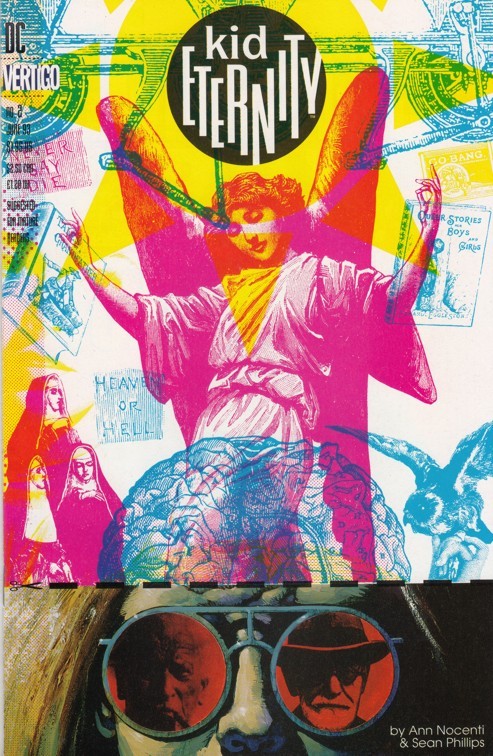
This cover says, "Don't look at who wrote it! Just look at how interesting these visuals are! Sucker."
In my review of Kid Eternity #1, I threw out a few theories on why Ann Nocenti's writing is so weird. After reading page one of this issue, I've thrown those theories out again but in a different way. That makes complete sense if you understand English idioms and also understand that everything Ann Nocenti writes is basically pre-trash.
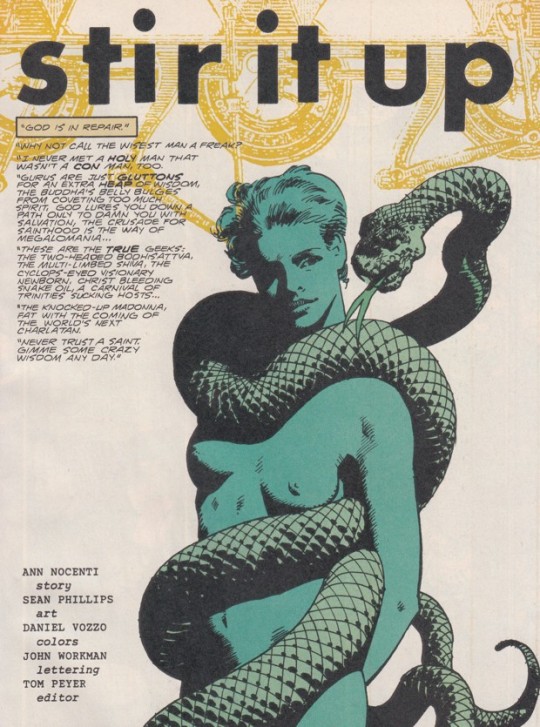
This is page one of Kid Eternity #2 and it will probably get this review banned on Tumblr.
I have a new theory: Ann Nocenti asked what a Vertigo comic book should be and editor Tom Peyer probably joked, "They're mostly tits and profound nonsense." So Ann Nocenti's vagina gobbed in her underwear and she squealed with glee. "That's what I do!" she chortled merrily! I probably shouldn't abuse Ann Nocenti for writing things I don't understand. I have plenty of choices of other people to abuse for it: my elementary school teachers for not calling me out on doing just enough to get by; my junior high school teachers who let me get away with not putting any effort into big year-end projects (In science, we were supposed to make a stone age tool. I rubber glued a carved-to-a-shoddy point stick to another stick (which was worse than my friend Robert who put some pine needles into a split stick, calling the weapon "Ow"); in English, we had one project based on Romeo and Juliet (because all we did that quarter was watch and read various versions of the play) and I refused to do it because the teacher was wasting my time; in Computers, I found Dan Felipe's project, a trivia program, and I just copied it and used it for my own project (changing all the questions and line numbers and other things to make it seem like it wasn't plagiarized but, I mean, come on! In fairness to me, I only did it because the stupid fucking school changed computers halfway through the semester, dropping the TRS-80s for Apples and my project was relying on the Poke images of the TRS-80 to create an animated sequence)); my high school English teacher, Mr. Borror, for reading nearly everything I wrote in front of the class so that I began to think I was the wittiest fucker in Santa Clara High; my college teachers for some reason or another that allows me to not blame my own lack of ability; and probably my parents because if they were any good at their parental jobs, I wouldn't be writing a blog about comic books. In other words, I'm sure Ann Nocenti is a philosophical genius while I'm just a guy who blames everybody else for things I don't understand. Even if I truly felt Ann Nocenti was an underrated genius whose writings I'm incapable of parsing, I would never ask her to explain what she meant by this first page of Kid Eternity #2. I just wouldn't feel comfortable putting her on the spot like that. It's not up to the artist to explain their art to the foolish audience! Only the Christian Messiah bears that responsibility (and, let's face it, he wouldn't have had to explain every fucking parable if he'd been able to convince smarter people of his bullshit). So if it's up to me to interpret this first page gibber gabber, I suppose I should get to business. Or kill myself. I mean, killing myself would be easier and less painful. And I totally would kill myself before reading more Ann Nocenti comic books except I have plans to cut my toenails in a few months. Before I begin trying to understand this hogwash, I'd like to point out that if she'd written it as a sonnet, I wouldn't have a problem with it. I'd read it, think, "Yep, that's a sonnet!", nod my head in sage understanding, and then jerk off to the titties. But this is not a sonnet so it is not allowed to be obtuse simply for obtuseness' sake. So this fucking speech. First off, who is speaking? The serpent trying to fuck the naked lady? Is this the speech the serpent used on Eve to get her to eat the fruit from the Tree of Knowledge of Good and Evil? Although if that's the case, how would talking about Buddha convince Eve of anything? I'll assume the serpent is omniscient (because he may or may not be Satan, depending on what holy men or con artists you believe but certainly isn't Satan if you're simply going by the Book of Genesis. I bet the serpent was God doing one of those Zeus things minus the rape. Zeus loved to trick people so he could get laid; Yahweh tricks people to test their faith). I guess since she had yet to eat from the Tree of Knowledge of Good and Evil (come on, God! That name is terrible), she wouldn't know what she doesn't know and can't defend against any nonsense the serpent spews at her. Let's assume the art goes with the speech and it's the serpent speaking. So why is "God in repair" and what the fuck does that mean? And why is it followed by the statement, "Why not call the wisest man a freak?" Does the snake only speak in non sequiturs? Was that a stupid question since I already know the snake's dialogue is being written by Ann Nocenti? It is kind of refreshing to see that her dialogue style never changed in thirty years. The shit the serpent says on this page could be nonsense spewed by Coil from Nocenti's New 52 Katana. You know what? I don't have to continue this because, in the end, it's just a carnival barker's pitch to get people to believe in the freaks in his freak show. He's all, "What's the difference between freaks and religion?!" That's not a riddle I have an answer for. The only religious joke I know is "What do Noah's Ark and The Bible have in common?" That might be a joke that was extant before I came up with it but I did come up with it on my own. And I think the answer is so obvious I would be insulting the intelligence of all four people reading this. Oh, and the snake trying to fuck the lady? It's a tattoo on the Tattooed Lady. The reason the comic begins in a circus freak show? Because Kid Eternity is the newest freak on display! The opening sideshow scene is just one of Kid Eternity's dreams. The demon angel babies get into Kid Eternity's dream and when he wakes up, they've tied his hair to the floor which totally has him trapped for like three panels. That was a close one! Kid Eternity decides he can't truly know what he's doing unless he utterly knows himself. So it's time to get his brain probed.

Let me guess: Carl will blather on about synchronicity and dreams while Freud tries to figure out how big Kid Eternity's penis is.
Carl doesn't initially discuss anything. He's just the straight man for Freud saying all the typical things you'd expect Freud to say: penis this, envy that, fuck your mom, kill your dad, more penises, many more penises, everything is penises. But then he comes on fast and furious with his archetypes and collective unconscious and human mythology stuff, all the biggest Carl Jung hits (aside from synchronicity but I'm sure he'll get around to that later. Ann Nocenti isn't going to miss showing the readers all the knowledge nuggets she mined to make her brain big). If only Nocenti would spend as much time writing the story as she spends making sure the readers know she knows a lot of shit then maybe I would have kept reading this comic book. Meanwhile, Zeus wanders around looking for somebody to trick fuck, Madame Blavatsky hunts down the next best burger before she slips back to the past, Beelzebub and Judas wander through Limbo, Jesus gets drunk and falls off a bar stool, and a phone yells at a woman. That all happens on one page to make sure the reader remembers other things are happening. But why does Ann Nocenti spend two panels of that dense page on Madame Blavatsky when she could have updated the reader on the non-X-File FBI agents who will probably hate fuck each other before the story ends? I also wanted an update on the Buddha Christ Trash Child. But no! Instead Nocenti just moves on to more of her proof that she's read all about Freud and Jung and totally understands the shallow top layer of their theories and philosophies. I don't mean to say I know any more than Ann Nocenti! But I understand how little I know of Freud and everything she's had him say are things everybody knows about Freud from all the dirty jokes about him: ids, supermen, parental relations, and phalli!
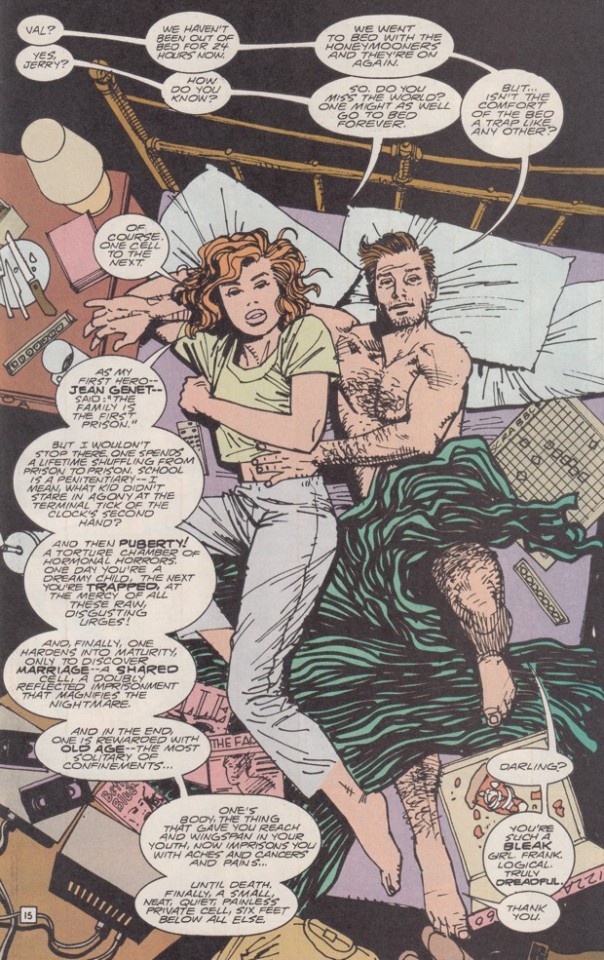
Oh, that's why we didn't get an update on the dense update page; Nocenti needed a full page to document the hate/fuck.
My new Ann Nocenti writing theory: Ann Nocenti has never had an original thought. She simply reads things, takes copious notes of bits and quotes she likes, and then shoves them sideways into whatever script she's currently writing. No wait. She does have original thoughts but they're almost not worth having. Like "everything in life is a prison" and then proving it by stating a few things about life that can be cell-like. It's profound in that way that things are profound when you're on acid. If you don't think about it, you can find yourself nodding along going, "Yeah! Yeah! Everything is a prison! Life is a fucking prison!" But if you do stop to think about it, it's like coming down off acid. You start to see how that thought you had about how the number three ties everything else in the universe together because of the way the corners meet didn't wasn't as mind blowing as it was six hours ago. Although the rant you went on about how pressing play on the VCR remote play the show and pressing pause pauses it but then to unpause it you have to hit pause again when you should really hit play was pretty fucking good. Speaking of acid, I'm two-thirds of the way through the acid documentary on Netflix and it's fucking fantastic. I wasn't really thinking a lot about it but I was nodding along going, "Yeah! Yeah! Everything they're saying about acid is absolutely spot on!" throughout. I actually had to take a break because it was making me too happy listening to all Sting and Carrie Fisher tell their acid stories. I don't know why I didn't just spend five paragraphs discussing why the FBI agents were playing Scrabble while they fucked. It's probably just one of Sean Phillips' kinks. Oh, maybe they were just playing Scrabble and not hate-fucking. It's hard to tell because on the next page, Jerry asks Val if they can finally fuck and Val is all, "You're a nerd!" Then she slits his throat. But then in the next panel, his throat isn't slit and he's all, "You feeling better?" And she's all, "Yeah!" So I don't know what the fuck is going on and I don't really care. I've still got like eight pages of this mess to get through and I'd rather just nod along than try to understand it. And then just like last issue, Ann Nocenti sputters out a bit of writing that I totally agree with because I've said basically the same thing before. About how every day, I fall in love with some person I see on the street because of the smallest of things. And then I love them forever.
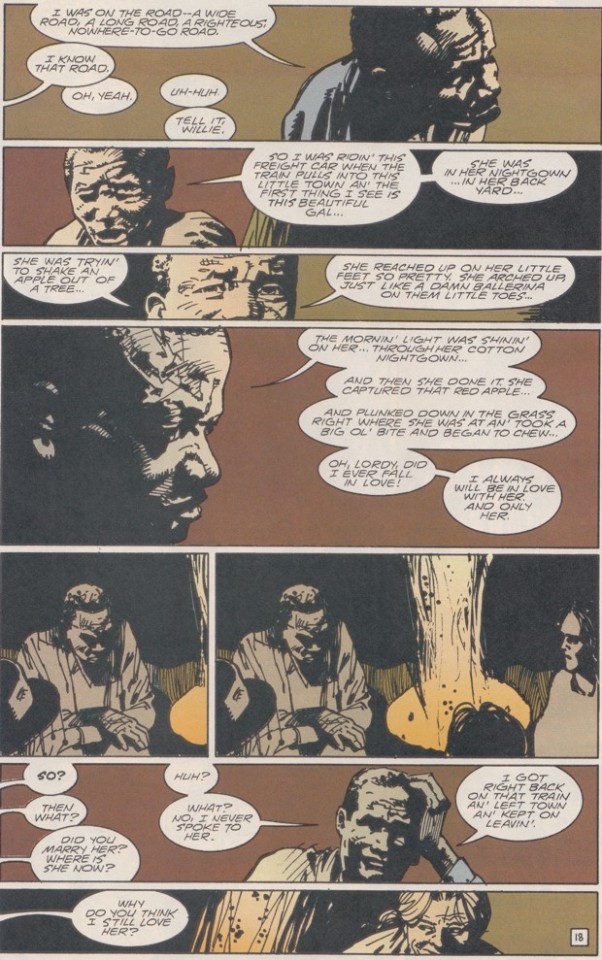
My story isn't as good but I once fell in love walking through the airport in Minneapolis. I was passing by an attractive woman and she was gazing off somewhere as I looked at her face. She was coming up on my right and then I glanced down at her breasts and back up at her face. And that was the moment she noticed me, as I glanced from her breasts to her face. And, catching me, she smiled and laughed and kept on walking. And I still love her to this day.
And for this page alone, I forgive all of Ann Nocenti's past (future?) transgressions and find myself eager to read Kid Eternity #3. Oh wait. I still have a few pages left in this piece of crap. I read a lot of books in college that I sometimes still say are my favorite books but I should probably just say they stuck with me because I know which books are almost always in my top five and a lot of the ones in college aren't those. But Edith Wharton's Age of Innocence always stuck with me. It's possible that I completely missed the message of the novel but to me, the book was about how true love only exists when it's unrequited. Archer Day-Lewis doesn't love Ellen Pfeifer more than May Ryder for any other reason than that she was the one he didn't marry. It seemed to me that Wharton was trying to portray how hard love is and true, phenomenal love only exists in the imagination. Only a love we can imagine can remain magical. Only when we love an object, or the imaginary person we've placed on a pedestal, can we evade disappointment in the reality and flaws of another actual human being. Being in love with Ellen Pfeifer was easy because she wasn't there for all those years. There were no fights or disappointments or multiple times accidentally walking in on her taking a huge shit. She was pure and beautiful and imaginary. But then again, maybe that wasn't the point of the book at all. I was young and romantic at the time and I still absolutely loved the women I'd had unrequited crushes on in junior high and high school while my college relationship was slowly circling the drain due to personality conflicts. But not due to sex. The sex was fucking great! Anyway, Freud and Jung decide Kid Eternity is in denial and they leave. Hemlock and Dog spread some new reality across the world via a computer virus. Madame Blavatsky starts making time go backwards, probably so she can vomit up all the Twinkies she ate and eat them again with their delicious creamy filling. And the devil and Judas wind up in a bar in Limbo with Jesus to make plans for Kid Eternity. There's probably a lot more going on but there'd be too much for me to process even if it wasn't confused by Nocenti's writing style. No wonder I gave up on this book after three issues. There's no way by the third issue I could remember anything that was going on, if I even understood it the month prior. Kid Eternity #2 Rating: C-. A confusing mess that's about 90% Ann Nocenti just vomiting out things she's read. Even the things that, with the benefit of the doubt, I want to believe sprang from her own philosophical musings, I can't bring myself to absolutely believe it. I feel like every thought and piece of dialogue she's placed in this story just came from piles of notebooks filled with notes she's made while reading other people's works. It's practically a collage of philosophical ideas and moral musings pulled from myriad sources and shoved into a Kid Eternity framework "written" by Ann Nocenti. Which could explain Nocenti's penchant for stilted dialogue. If she were making up all the character's thoughts, the dialogue would flow from one character to the next. But when each character can only respond with some profound thought Nocenti read elsewhere, it comes across like a ransom note, each word cut from the mind of somebody else and pasted as a reply to another bit cut from some other thinker, no relation existing between the two thoughts except the proximity relationship Nocenti has given them.
3 notes
·
View notes
Text
Evangelion: A FAQ
by @metaandpotatoes
Q: What, exactly, is an Eva?
A: Great question. An Eva is prehistoric goo heated to approximately 10000.9999999ºC then poured into a mould shaped carefully from the carcass of our quasi-religious-alien ancestors. After that, it’s flash frozen, rammed into the moon at light speed, and then animated for all our mecha fantasy needs.
Q: Doesn’t mecha imply mechanical though?
A: If you really think about it, isn’t the human body the most amazing mechanism of all? (#DYK the human hand has 27 bones in it? WOW! Don’t worry about what’s happening below. It can’t see you if you can’t see it.)

Q: Okay. So what are these giant robot monster machines for?
A: And when God created the Earth, He gave the life of His only forgotten Son so that humans may inhabit Him and use Him to break down the barriers between themselves and others and then stab the shit out of their hearts in a vain attempt to punish all life for being self-interested and self-sustaining.
Q: Is that really how the Bible goes?
Trust me, I have a divinity degree.
Q: Is this “barrier” situation like...a metaphor?
Oh no, it’s literal. There are invisible-but-totally-visible-because-animation Absolute Terror Fields between beings. Some beings have stronger fields than others, but rest easy knowing: Everyone is scared shitless of getting close to another thing. YOU ARE NOT ALONE. (Except you are. That’s why you must get in the robot.)
Q: Are you scared shitless of getting close to another thing?
Of fucking course I am, what do I look like, an empty shell existent in an equally empty universe?
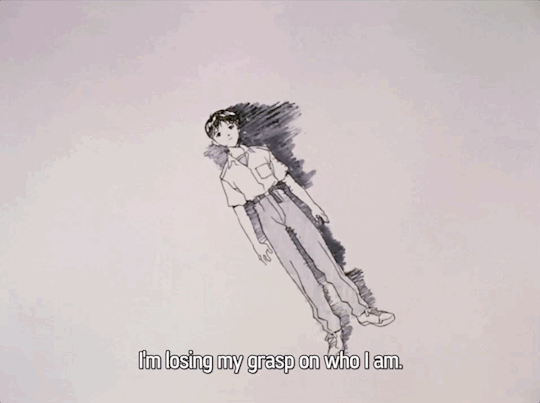
Q: Why can’t Shinji get in the robot?
Why can’t you get out of bed every morning bright-eyed and bushy tailed without fail to go to your soul-sucking job?
Q: But he needs to like, save the world. I’m just helping capitalist drones buy shit they don’t need. Why can’t he get in the robot?
Are you really saving the world if you’re destroying it in the process?
Q: Hey, I’m supposed to be asking the questions here.
Fine. By logic of predestination, God has already determined who will be saved and who will be damned, so Shinji is just taking the logical path of not fucking things up any further trying to fight against that idea.
Q: So you’re saying Shinji is a Calvinist?
I’m saying that Shinji has never said he’s NOT a Calvinist.
Q: What’s up with all this religion anyway?
It’s right in the title: Neon Genesis Evangelion. There’s like, 20 layers of religion there:
Neon => neos => something new => New Testament
Genesis => creation => first book of the Old Testament (NB: Hebrew Bible) => the story of God’s new (soon to be old, because original sin and aging, WHAT FUN) creation etc., etc.
Evangelion => evangel => word for the Christian gospel (good news!) or for someone who goes around and evangelizes, aka spreads the good news (gospel!). (Evangelion also conveniently contains the word angel! Crazy amirite!?)
SO you could say that Evangelion’s title is like: New Beginning for the Good News (or the people that spread it). Whether humans or angels spread the good news...and whether...y’know, it’s actually good news is...well...up for the viewer to decide.
I, personally, welcome our singularity-obsessed orange goo overlords.
Q: Sounds like a lot of Judeo-Christian imagery is at play here...
HOLD THE FUCK ON WE DO NOT USE THAT TERM, THAT IS A MEANINGLESS TERM. EDUCATE YOURSELF: https://newrepublic.com/article/153867/arguing-bad-faith
Q: Can you give me the TL;DR?
TL;DR, “Judeo-Christian” erroneously equates two extremely different and complex religions, and carries the frankly offensive assumption that Christianity is a more evolved form of Judaism while leaving out a third religion that shares many of the same commonalities as Christianity and Judaism (Islam).
TL;DR squared: We don’t use the term “Judeo-Christian-Islamic,” so you should immediately find “Judeo-Christian” to be sketchy af.
Also, the term gained popularity through use by mid-20th-century Christian evangelicals, who had a huge stake in 1) courting Jewish folks (who they didn’t really like but wanted to seem like they liked) and 2) getting the state of Israel established so that they can usher in the second coming or something.
TL;DR squared part two: Once upon a time it was politically convenient for Christians to link themselves with Judaism, so they did, and it’s a useless term that we shouldn’t use outside of a very specific context.
Q: Speaking of, what is this Second Impact?
Oh that’s easy: Adam hurtled into Antarctica at lightspeed and sent the world into post-apocalyptic meltdown.
Q: Wait, Adam like...Adam Adam? Adam and Eve Adam?
In the words of Hideaki Anno: “Any moron should be able to tell this references Adam and Eve.”
Q: O-kay.
Look, what I’m going to say is: Neon Genesis Evangelion is a fascinating and important example of a decidedly non-Christian (in this case, culturally and personally) interpretation of quote-unquote Christianity—of like, the cool parts of Christianity. The apocryphal texts. The wacky subcategories of angels. The miracles. The Oedipal imagery.
That kind of batshit interpretation is important. It’s been happening the other way (e.g., off-the-wall Western interpretations of Zen Buddhism) around for a longggg time. These kinds of interpretations (some might call them “appropriations”) are, in my opinion, not fundamentally good or bad—the good or bad shit is brought on by, you know, using those interpretations to oppress and/or marginalize people. They are, however, fundamentally productive in that they make something new for the world to either chew up and digest into unusable diarrhea or mull over like cud until something even more productive or interesting results.
Like, the key to interpreting Eva through the lens of Christianity is to remember to put the lens of a non-Christian on top of it. Shit’s gonna be smashed together that people raised in Christian context don’t think are similar.
Like, Lilith doesn’t really register for most modern Western Christians, I’d venture, especially in the context of Adam and Longinus (got a lot of old and new testament mixing going on here).
But thematically, it makes sense: Fringe folks (from my understanding; this is where I disclaim that I spent 90% of my time in Divinity School studying Buddhism and angst) pin Lilith as the real first woman and therefore the original companion for Adam; Lilith getting run off the scene and replaced with Eve is kind of a crucifixion, I guess, seeing how women are usually treated by Christianity, etc. Did Anno go this far in his interpretation? Who fucking knows. The important part is that we can. AND WE WILL.
Q: Isn’t that cultural appropriation?
This is an interesting question that falls out of the scope of this shitpost of an FAQ.
Q: ...I’m out of questions.
That’s fine. You’ll come up with more later. I know because I am you and you are me and we always come up with more questions.
In the meantime: Take care of yourself. (Read: Take your antidepressants.)
23 notes
·
View notes
Text
001. MEET JULES
FULL NAME: jules antoine beauchamp. PREFERRED NAME: jules. NICKNAME/S: jul. DATE OF BIRTH: november 13th, 1999. GENDER & PRONOUNS: cis male & he/his. ORIENTATION: hetero. RELIGION: non-practicing christian. RELATIONSHIP STATUS: in a relationship with noémie leroux. OCCUPATION: full time university student. RESIDENCE: flatiron district, new york city.
002. CHECK JULES’ BACKGROUND
HOMETOWN: saint tropez, france. NATIONALITY: french. ETHNIC BACKGROUND: french and italian. LINGUISTICS: french which is his native language and english and italian in a fluent level. EDUCATION: he studies mechanical engineering at columbia university. CRIMINAL RECORD: clean. BIRTH ORDER: second though he’s now an only child. FATHER: françois pierre beauchamp, born on june 6th, 1970 in rennes, france, currently residing in montecarlo, monaco. he is a businessman and the owner and CEO of rocamadour spirits group. MOTHER: vivienne giulia del vecchio, born on september 14th, 1974 in sicily, italy, currently residing in montecarlo, monaco. she is an italian billionaire heiress, writer and the owner of del vecchio oil group. SISTER/S: none. BROTHER/S: guillaume maxime beauchamp, born on april 17th, 1997 in saint tropez, france, passed away on july 16th, 2000 in saint tropez, france. SIGNIFICANT OTHER: noémie leroux. CHILDREN: none so far. OTHER RELEVANT FAMILY: none. EX/ES: none, he didn’t have any solid relationships before noémie. PETS: moon, a cavalier king charles.
003. GET UP CLOSE & PERSONAL
HEIGHT: 6′0″ or 183 cm. WEIGHT: between 171 lbs or 77.5 kg and 175 lbs or 79 kg. BODY BUILD: as someone who has exercised and been involved in sports from a young age, jules has always been what would be described as fit. though he’s not obsessed about his diet or his routines, he prefers to eat clean and keep up a 5 to 6 day a week work out schedule. this being said, he has an overall athletic frame with particularly defined abs, toned legs and arms. EYE COLOR: brown. EYESIGHT: his eyesight has no problems. HAIR COLOR & STYLE: he has blonde, lighter during summer, darker in winter months and usually he has his hair shorter on the sides and longer on the top so a very low maintenance look that isn’t particularly hard to style. DOMINANT HAND: right. NOTABLE PHYSICAL TRAITS: his smile which, following most people’s opinion, seems to make him seem even younger than he is. overall, if it could be considered as such, the hint of youth, often mistaken by shyness, that his features portray. as the opposition to it, the amount of tattoos scattered all over his body are a standout, as is his athletic frame. SCARS AND MARKS: on top of the usual every day little scars and marks, jules has some which are courtesy of all the exercise he does on a daily basis. otherwise, there’s nothing that is particularly notable or that stands out. TATTOOS: he got a shhh… on the underside of the index finger of his left hand — reference. his following piece consists of a cross with wings on the back of his neck — reference — something that symbolizes his faith and personal beliefs, and definitely the one tattoo he doesn’t like to expand much on for it’s a touchy one. soon afterwards, when one of his best friends - gabrielle - decided she wanted to get inked but was reticent since it would be a first, jules ended up going with her and getting a matching piece ; gabrielle’s micro tattoo reads we’re all in the same game; just different levels split into two parts in a cursive kind of font and is placed on the inside of her left wrist, whereas jules’ completes it and reads dealing with the same hell; just different devils. - his is also split in two, the same font, except it’s placed on the inside of his right wrist. as a consequence of a night where him, léo and henri got completely plastered, he has a smiley face tattooed on his toe. later on, and as the fulfillment of something he really wanted, jules proceeded to get the first piece of what would soon become a half sleeve on his left arm. he got a roaring tiger to symbolize his independence and free spirit while at the same representing strength. a little above it, and completing the half sleeve, he has a blooming rose which has more than one meaning to him - it was chosen to complement the tiger because despite the power and strength, he wishes for balance within his life but more so, and the primary reason why he acquired it back in the day, it’s because, atop of being one of noémie’s favorite flowers, roses can symbolize hope which, truly, translated into, back when he got it, him hoping for the best and hoping they would get together one day. next to the rose and above the tiger, he has a treble clef simply to symbolize his love for music. atop of his half sleeve, on the back of his left arm, he then got two fists bumping, another matching tattoo he got with gabrielle when he was visiting her in kailua. he has a distortion clock, dali’s style, merged into the back of his half sleeve, a tattoo he got soon after noémie started dating mathis and he got his heart broken. clock tattoos often represent an endless love, the meaning stands for his, the distortion only adds to the meaning by representing how heartbroken and helpless he felt at the time. towards the end of his half sleeve, and on the inside of his left wrist, he has the geographic coordinates both to where guillaume - his older brother - was born and where he passed away. he has a diamond, also merged into the back of his sleeve, something he has gotten when he was going through a rough patch as a reminder to focus on the positivity and be strong. additionally, within the half sleeve, you’ll find some more pieces like a G., the initial of his deceased brother’s first name; an anchor, something he got randomly but that also reminds him to stay grounded and a micro tattoo saying côte d’azur meant to represent his home. lastly, merged into the back of his half sleeve, he has a blacklight tattoo that’s otherwise invisible to the eye, reading six septembre, noé’s birthdate. he has the world map with a plane flying in between continents and a compass next to it, on the inside of his right bicep, something that he got soon after realizing he wanted to see more of the world and that he wasn’t willing to, eternally, stay in south of france. as for more recent tattoos, he has gotten the quote peace of mind on his left upper arm which he has begun to shade, and thus begun to extend his half-sleeve into a proper full-sleeve tattoo. higher above the two fists bumping he’s gotten with gabrielle, and complementing the tattoo with some additional shading, he has two keys crossing over each other with a V on one of the keys and a F on the other, representing two key people in his life - vivienne and françois, his mother and father respectively and next to it, he has a tiny sashimi roll tattooed, not really meaning much other than his love for food and sushi. likewise, merged into the others with the shading and all, he has a endless knot on the back of his arm. he has the sentence mon mond fou on the right side of his ribcage, in white ink. along his left hip, he has the quote il vaut mieux faire que dire meaning doing is better than saying, which resembles the whole actions are better than words, something jules avidly believes in. on the underside of his ring finger, he has a N’s - not-so-subtly meaning he’s noémie’s - followed by a micro dix juin - which is when he and noé officially started dating. he has the quote mind over matter is magic along the outer side of his right foot, a note to self more so than anything else, and on his right side, often covered up by his arm, he has the sentence la famille avant tout vertically tattooed in micro, cursive font. PIERCINGS: none. VOICECLAIM: fabio quartararo. ACCENT & INTENSITY: though he spends a good chunk of his time speaking english and has been immersed in the new york environment for nearly a year, there’s no hint of a new yorker accent. from his words down to his enunciation and the way he carries himself as he speaks, you can tell he’s french. the little twists and quirks attached to the words make the south of france accent peer through and the fact his closest friends and girlfriend are french as well, help keeping the accent and its intensity intact. ALLERGIES: apples and cashews. PHOBIAS & FEARS: being stuck in the same place - he’s not claustrophobic but the idea of being confined to a space, no matter how small or how big, it tends to send him spiraling into a state of utmost anxiety. MENTAL & PHYSICAL ILLNESSES: none so far. ALCOHOL USE: sometimes, mostly on social situations. SMOKING: he doesn’t smoke. NARCOTICS USE: no, he doesn’t use drugs. INDULGENT FOOD: it’s not something jul does very often. SPLURGE SPENDING: very rarely. GAMBLING: no, never.
004. DIG DEEPER
CAN THEY DRIVE? yes, he can drive. CAN THEY COOK & BAKE? yes and yes. CAN THEY CHANGE A FLAT TIRE? yes. CAN THEY TIE A TIE? ish. CAN THEY SWIM? yes. CAN THEY RIDE A BICYCLE? yes. CAN THEY JUMP START A CAR? no. CAN THEY BRAID HAIR? badly. CAN THEY PICK A LOCK? no. EXTROVERTED OR INTROVERTED? extroverted. DISORGANIZED OR ORGANIZED? in-between. CLOSE OR OPEN MINDED? open minded. CALM OR ANXIOUS? calm. PATIENT OR IMPATIENT? patient. OUTSPOKEN OR RESERVED? in-between. LEADER OR FOLLOWER? in-between. OPTIMISTIC OR PESSIMISTIC? optimistic. TRADITIONAL OR MODERN? modern. HARD-WORKING OR LAZY? hard-working. CULTURED OR UNCULTURED? cultured. LOYAL OR DISLOYAL? loyal. FAITHFUL OR UNFAITHFUL? faithful. NIGHT OWL OR EARLY BIRD? a mixture of both depending on the days. HEAVY OR LIGHT SLEEPER? not heavy, nor light. an in-between. COFFEE OR TEA? coffee. DAY OR NIGHT? night. TAKING BATHS OR SHOWERS? showers. COCA COLA OR PEPSI? neither. CATS OR DOGS? dogs. NETFLIX OR CINEMA? netflix. SHOWS OR MOVIES? shows. LAPTOP OR GAMING CONSOLE? gaming console. HEALTHY OR JUNK FOOD? healthy food. ICE CREAM OR FROZEN YOGURT? frozen yogurt. PIZZA OR HAMBURGER? pizza. LOLLIPOPS OR GUMMY WORMS? neither. BEACH OR POOL? beach. SNOWBALLS FIGHTING OR ICESKATING? snowballs fighting. LITERATURE OR SCIENCE? science. HISTORY OR ART? art. CHOCOLATE BARS OR COTTON CANDY? neither. XBOX OR PLAYSTATION? playstation. FACE-TO-FACE OR PHONE INTERACTIONS? face-to-face interactions. DRAMA OR SCI-FI? both. HORROR OR COMEDY? comedy.
005. JULES’ FAVORITES
FAVORITE ACTIVITY: working out. FAVORITE ANIMAL: lion. FAVORITE BOOK: thinking, fast and slow by daniel kahneman. FAVORITE COLOR/S: green. FAVORITE CUISINE: italian. FAVORITE DISH/ES: pissaladière, pan bagnat, gnocchi, profiterole, bananas foster. FAVORITE DRINK/S: pumpkin spice latte and plain iced water. FAVORITE FLOWER/S: roses. FAVORITE GEM: emerald. FAVORITE MOVIE: green book by peter farrelly. FAVORITE SONG: mile high by james blake and travis scott. FAVORITE SCENT/S: citrus, jasmine and musk. FAVORITE SHOW/S: brooklyn nine-nine, how i met your mother, f.r.i.e.n.d.s, the office, fresh prince of bel air, the big bang theory, new girl, the simpsons & rick and morty. FAVORITE SPORT/S & TEAM THEY SUPPORT: soccer, he supports as monaco and juventus fc, motogp, he supports yamaha moto racing, formula 1, he supports mercedes amg petronas, tennis and cycling. FAVORITE SEASON OF THE YEAR: summer. VACATION DESTINATION: banff, canada and anywhere in croatia.
1 note
·
View note
Text
manifestation and religion
disclaimer: im going to write my opinions on religion and if you consider yourself a believer - dont get offended as we all have different experiences and beliefs. also, i will be mentioning some stuff that most people find weird and unusual so please keep your mind open and leave your judgment somewhere else.
i wrote quite a bit and then my clumsy ass accidentally closed all tabs and everything was gone so this time ill write my intro in short version. so we all heard the saying ‘’be careful what you wish for it may come true’’. well it does come true and it has proved to me so many times, and before i get to the basics of law of attraction and manifestation I am going to say a bit of background how i got to it all.
as most of my country i was raised christian and had to practice the religion until i was 14/15 and got my holy confirmation so after that i was finally happy that i did not have to go to church if i did not want to. my family is not super religious, we do follow the holiday traditions and such as its normal in our country, but personally i dont give them much meaning. two of my family members are religious and i am grateful because in a place as my hometown our parents gave us free will when i came to religion (after our confirmation only :P) .
with all my experience and research i came to realise that christianity is most rotten, corrupted, vile and disgusting religion there is. there are exceptions that were better than rest, that is a small number unfortunately. i always considered myself agnostic, there is no defined god but there is something bigger than humankind and its still unknown. and you look at all the religions you will find that mostly all of them have same stories, people and facts, just bit amended to their culture. so to explain a bit, here is internet definition of agnosticism # Agnosticism is the view that the existence of God, of the divine or the supernatural is unknown or unknowable. Another definition provided is the view that "human reason is incapable of providing sufficient rational grounds to justify either the belief that God exists or the belief that God does not exist." and no, atheist is not the same. heres couple of pictures giving some insights
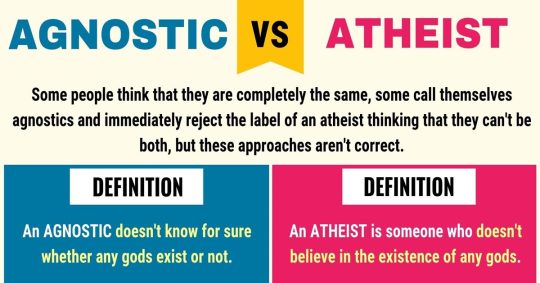

so now that we have that sorted out i would like to stress out that i never had anything against people who believe in god or dont believe in god, i have friends who are strong believers and friends who are atheist, its just called being adult and accepting people as they are. not enough people can do that.
so i did lots of research on religions and i do like polytheism ( Polytheism is the worship of or belief in multiple deities, which are usually assembled into a pantheon of gods and goddesses, along with their own religions and rituals) so i always had huge interest in roman and Greek deities, Egyptian as well and for a while was reading about Hinduism. of course i read a lot about all other older civilizations and most of them are based on polytheism.
during my exploring i came across a doctrine about paganism (havent fully finished all the books and here is a link if anyone would be interested in buying https://despot-infinitus.com/proizvod/paganizam-u-teoriji-i-praksi-doktrina-paganizma/) and i really liked the whole idea of it and i am still actively considering of becoming a white witch/wicca and reading those books inspired adding bit more on my pentagram tattoo, which is actually representing five elements so with added moons it represents triple goddess symbol.
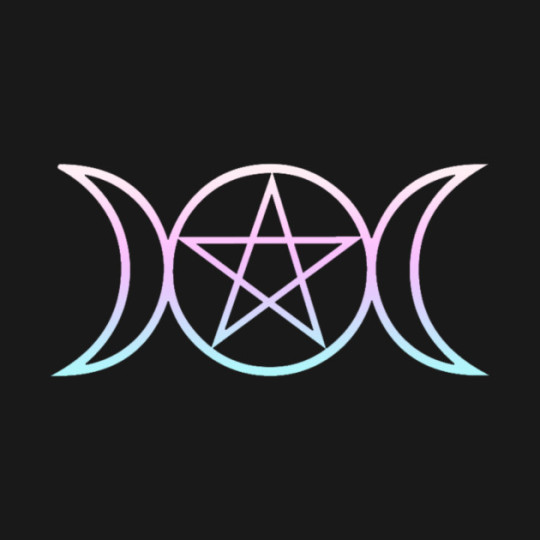
many people ask me is that devils sign and am i a satanist, and that is ridiculous assumption based on only one symbol. and as a matter of fact i have been reading about satanism itself as well (of course i have) and its quite surprisingly peaceful religion and makes more sense than christianity does. to read more about their rules (which are way better than 10 commandments) click here - https://en.wikipedia.org/wiki/LaVeyan_Satanism#Basic_tenets
those who know me a bit better know that i love paranormal stuff and that i have strong connection with it and that caused a lot of paranormal experiences in my life (i bring all the ghosts to your yard aaayyy) so i recently also discovered demonology ( Demonology is the study of demons or beliefs about demons. They may be human, or nonhuman, separable souls, or discarnate spirits which have never inhabited a body.) and that you can actually learn how to practice it and cant lie that also interests me as well as you contact demons and entities and you work together to learn about world and history and you give them chance to peacefully experience the world (they literally posses you and that way they get to taste food and emotions etc)
yes this is quite informative post as well. and yes, you will all probably deem me insane after reading all this. and what i noticed is that all of them mentioned above work on the principle of cooperation, you have to give to receive. and i dont mean like you have to make blood sacrifices to get your wishes, i mean you have to put in some effort in it and show good intentions and most important of all - you have to show some respect.
so to finally get to the reason why you are all here. manifestation and law of attraction.
there were loads of instances in my life where i noticed small details that most of people wouldnt notice and after googling them one word kept coming up - universe. so automatically when you start look into that law of attraction and manifestation come up as well, they all g hand in hand like little happy family.
So law of attraction is something you all definitely had experience with. Basically its what you put out to the world is what you get. Simple change of mindset can change everything in your life. Have you noticed when you are happy and spreading happiness everything around you seems nicer, people are nicer to you, nice things happen and then when you are in bad mood everything is going bad.
Sounds familiar? That is law of attraction for you people. you’re releasing/giving good vibes to the atmosphere and people around you so universe makes sure to give good things back. notice that give and take relationship here? Dont be fooled tho, its not always as simple as it sounds. it is especially hard when you get into that deep hole of feeling bad a and depressed. it is really hard to change your train of thoughts and get yourself to think positive. universe wont award you for one good thought, it has to be series of it and you really need to feel them. you truly need to be in a good moment to get something back from universe.
say thank you to people serving you, ask people how are they, show that you care, pick up a paper from street and throw it in a bin, smile to everyone, pet a random animal on a street, anything counts. and dont do it just because you expect something huge from universe as most of the time universe will give back with good things as well, someone will help you, smeone will compliment you, you’ll get free cup of coffee, just random things like that. you will be surprised that good things will come to you in a moment you need. it also makes you more grateful for everything in your life and makes your everyday nicer and more positive.
then we come to manifestation.
thiiiiiis my people is bit more complicated than just law of attraction, but one without other does not go. there is no definition of the manifestation, but it is a fact that if you want something really bad universe will give it to you. i had universe manifest so many of my things that i wanted, just took a bit of time. maybe it has happened for you too. sit and think how many things did you wish for and you have them now? there are certainly more than few things that come to your mind. i can easily name at least 10 things that universe manifested for me without even realizing that was it.
there are many ways to manifest something and it is impossible for me to write everything about it in this post as it is bit more complicated than law of attraction, but i will try to outline some things and believe me when you google manifestation you will find loads of examples and you can read for days about it.
every single wish you want to manifest you can, it just requires some work and that is the hardest part. there are many ways of manifesting something, scribbling, drawing, visualizing, meditating and many more - you need to find something that works the best for you. you need to have clear vision of what you want (general idea wont work), you have to want it really strongly and you need to start working towards it, even little steps - remember when i said you have to give to receive, same with universe. it wont just drop it in your lap because you decided it would be beneficial for you.
and have in mind very important thing universe will always provide and it will give you what you deserve when you are ready for it.
so yes, it means it can take waaaay longer than you expect it, it may not be hours, days it may be years, it just means that you are not ready for it yet but that doesnt mean universe is not working on bringing it to you. all the work you put into it will definitely be worth it.
for example i fell in love in marketing in university and always wanted a job in that field. it did not get easy to me at all. i spent long five years applying for the jobs and either getting rejections or no answer. and believe me that could put me in such bad mood sometimes that i just wanted to give up on everything. add to that anxiety struggles and that makes it even harder. and as mentioned in the last year i worked on myself mentally, my anxiety has been on lower levels for a while and it does spike up now and then and it messes things up, but i’ve been happier mentally then i ever was in last 5 years and towards end of the last year more and more good things started to come my way and then i finally got that long awaited job.
i am still looking a proper way to thank universe for making it happen for me as that is also important thing for manifestation.
going to use myself as example - being a cheerleader, moving to another country, going to enrique iglesias concerts, visiting loch ness and Neuschwanstein Castle and many more were just big wishes at one point and so far they all came true and i couldnt be happier. it can be small things as well, once i tried to test it and i wanted to manifest a drink date. so i kept thinking how i will go for a drink with someone next week. and it happened, next week i went for a drink with a guy i just met, completely unexpectedly. i didnt specify anything else other than gooing for a drink at that was the only thing that happened.
once wished for more money (also nothing specific stupid me haha) and after two days i found €5 on the floor. not much but universe did provide what i wanted :D
as i’ve said, manifestation is more complicated than law attraction and requires strong mind and strong will, so not only that you get what you wish and work for - it makes you a better person as well! To end this i am going to leave couple of links you can visit and see more about them, or if you’re more adventurous just google manifestation and enjoy your journey :) https://medium.com/thrive-global/9-principles-of-conscious-manifestation-3d2df7a4a87
https://elysesantilli.com/what-is-manifestation/
https://blog.mindvalley.com/manifestation/
https://www.youtube.com/channel/UCZNFXNnKOLdA5ZD7Sn2p5aQ/videos
https://www.youtube.com/channel/UCvptCAXYmDZMOffniGRfomQ/videos
#new post#manifestation#law of attraction#universe#believe#follow#Followme#follow for follow#fun#religion#thoughts
1 note
·
View note
Note
What were some parts of seminary that you liked, versus ones you didn’t? I’m thinking about my future (read: freaking tf out) and I know I want to study theology in some way, I’m just not sure how exactly, ya feel?
Thanks for the question! Your mileage may vary: I went to a Princeton Seminary, which I would categorize as a theologically/politically moderate, academic, traditional Western-style seminary. Seminary culture varies WIDELY from school to school, so keep that in mind when choosing between, say, a Princeton, which may be a more insular academic community focused on research and internships, and a Fuller, which may be a larger community more integrated with the surrounding city concerned with practical training for missionaries, worship leaders, and Christian artists. This is NOT to say that you can’t learn to be an awesome worship leader at PTS (I know them) or an awesome theology professor at Fuller, but make sure you shop around for your particular cultural, career, and academic needs.
Things I Loved
The residential experience. Nearly all students at PTS live in beautiful on-campus housing or in apartments specialized for families with children just a few miles away. Living a few minutes walk from the library, my professors’ offices, and the chapel was amazing, especially since students at PTS tend to be sociable with the others who live on their hall. I would often spend my evenings studying with friends in their dorm rooms, and since everyone on campus at any given time tends to eat their meals in the cafeteria together, I formed a strong clique of ten or so people who unpacked my readings + spiritual crises with me at the lunch table.
Spiritual friendships. I was able to make deeper friends than ever before in my life from a variety of denominational and theological backgrounds. We saw each other through vocational shifts, prayed with each other, administered the Eucharist to each other, celebrated birthdays and ordinations together, and stayed up late into the night when anyone needed us. I would literally drive across the country to bail any of them out of jail at a moment’s notice.
The emotional crucible. Seminary is bootcamp for the soul. You get exposed to so many new ideas and theologies, learn how to preach, sit at people’s bedside while they’re sick, pull together responses for every new act of violence in the news, and most of the time, are thrust into a leadership role at a church that is either going under and begging you to save them or so large and thriving that it nearly swallows you whole. Nothing will grow you up like that. I have an insane amount of poise now dealing with other people’s crises, rage, or grief, and that wasn’t the case when I matriculated. Pastors are all making it up as we go along, but seminary gives at least the appearance of sage wisdom under pressure.
Academic engagement with theology. This one seems obvious, but after spending four years in a secular liberal arts university that was tolerant of my enduring interest in religion but didn’t offer me an outlet for it, seminary was balm in Gilead. I loved being able to dig into what I really cared about directly, be that metaphysics, church history, or the Bible as literature, and I thrived being surrounded by other people who cared about it and did the reading and wanted to explore together.
Freedom to research what I wanted. There are plenty of demanding intro-level courses that throw you to the ground and kick you while you cry into your notecards (New Testament, what’s good) but it was fun being on that ride with the rest of your small cohort, and upper-level classes offered chances to research what you cared about. I got to present research on astrology in the book of Daniel, queer American Muslim communities, IVF treatments and theology in Ghana, overlap in myths about Odin and Jesus, and I did an independent research study linking the emergent church to the spike in Millennials re-discovering the Episcopal and Catholic churches.The library was stuffed to the brim with books I would kill for. What a treat.
The melting pot. PTS DEFINITELY has its ideological and admissions biases but they do work hard to create a diverse student body, and I was close with students from so many different counties, denominations, ethnicities, and political leanings, which was enriching beyond belief. It was one of the big reasons I chose a seminary degree. That said, not all schools skew diverse, and I was very specific about choosing a seminary that was explicitly affirming of women in ministry and the goodness and wholeness of LGBTQ+ folks, so I knew that I would be supported by general school policies. Getting that information up front is important.
Access to university resources. This one is PTS specific, but I went to a independent seminary closely linked to and basically on the same campus as Princeton University (they were the same school back in the 1800s until an amicable split, but we’re still cozy). This meant that I had access to Princeton U libraries, free events, lectures, and religious life, and I was a member of the Episcopal Church at Princeton U for most of my time at seminary. People bribe admissions officials or work themselves to nervous breakdown to get access to the resources I had at my fingertips, and I don’t take that for granted.
The aesthetic. If I’m gong to take tens of thousands dollars of loans out for graduate school you bet you’re ass I’m going to be sitting in American Hogwarts while I do it.
Things I Did Not
The cliquishness. This one is a double-edged sword, because I thrived on having a clique of high-functioning. highly-educated pastors who ate at the same lunch table and gossiped about the same people and showed up to campus parties in a gang, but that’s not always healthy. People tended to fragment off by denomination or where they fall on the liberal-conservative scale, and differences can fester that way. Students of color were often implicitly excluded from certain spaces through this behavior. Humans skew towards tribalism to begin with, but when you put super socially-oriented people with strong beliefs in one space where they have to live on top of each other and are looking for low-effort socializing after a long day in the trauma ward, confessional, or picket line, it gets worse.
Imposter syndrome. Maybe it’s grad school in general that does this, but I spent most of my degree fighting off the feeling that I was dumb, lazy, not serious enough about my “calling” or my research, and probably a heretic. Part of my character growth came from learning not to give a fuck about what people who didn’t share my passions thought of them, and from realizing that I wasn’t on the ordination or PhD track like most of my peers, and that was okay. So I grew from this, but it stung like hell. I cried a lot.
No handholding. The professors at PTS were, by and large, old school, and they were busy as hell. While there was opportunities for office hours, most engagement with professors came in the performative form of “a question, well, more of a comment really” during lectures. Students, (mostly men, I’m not going to lie to you) scrambling for a good letter of rec for a PhD tended to monopolize whatever time professors had. I can think of exceptions (Ellen Charry was exceptional and made time for me in her home when I was struggling to unpack antisemitic theology) but it was a far cry from the literature department in my undergrad, where professors were accessible and knew me personally as mentors and friends.
Caregiver burnout. This is my big one, and is the reason I’m still in recoup mode doing the office job thing instead of working in formal ministry. Everyone at my school was a pastor, hospital chaplain, activist, or social worker. We are the people who care so much, and who are constantly doing emotional labor for those around us with no time off and usually, poor personal boundaries. Working in a field where it is your job to hold everyone’s hurt and be the face of God to them while their life falls apart is….hard. It was not unusual for me to work ten hours at Penn on my feet in campus ministry, helping people sort through whether or not they wanted to report their sexual assault, holding mini-interventions about excessive drinking, and scrambling to re-schedule worship night after my volunteer went to the hospital after a suicide attempt, and then ride the train home while my phone blew up with news of a new mass shooting that I would have to help host a candlelight vigil for. You hold your parishioner’s hand while they die in hospice. You watch social services take your client’s children away. You stand still while someone screams at you for being too political in your sermon, or not political enough. You sit down to do the budget only to realize the beloved pastor who just retired had been embezzling. Typical Tuesday.
A lot of the items on these lists are specific to my temperament and the culture at PTS, but by and large I would say it was an amazing experience well worth my time, effort, and money. I pushed myself academically beyond what I believed I was capable of, made the deepest friends of my life, found a home denomination, learned how to effectively care for others and myself, and was met by God in transformative ways again and again. Someday I may get that ordination or work for a ministry nonprofit again, but I have skills now that no one can take away from me, skills I use every day in some capacity.
Good luck in your discernment process, and I pray you find yourself in exactly the place you need to be!
#people of the page#princeton theological seminary#princeton seminary#seminary#grad school#studyblr#gradblr#theology
34 notes
·
View notes
Text
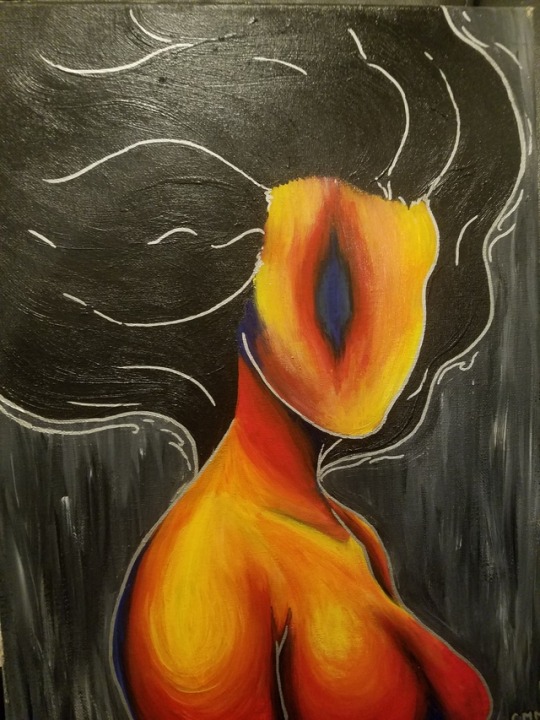
What it means to me to practice Chaos Magic...
Disclaimer: my belief is my belief, open for discussion but NOT prosecution. If you have nothing nice to say do not say anything at all. I am however, open to learning new things so feel free to share information.
First an introduction as to why it resonates with me. I was raised in the stereotypical "good Christian home", my parents were firm believers in Big G and I was too, but my parents were both also firm believers in science. My mother taught me that miracles are just science we dont understand yet, and Big G can do miracles because he knows the code of the universe; he created it.
That's where I started to wonder, if the man upstairs can know the code of the universe, maybe I can too. Then the more i learned about science and the Christian ideology, the less I understood why people still believed in Big G. It was the whole "If he promotes love and life why does he let bad things happen?" argument. Then I began to study the teachings and ideology and texts of OTHER world religions, that's when my eyes started to open. Every religion on the planet has basically the same guidelines: Love your fellow man, enhance your spirituality/connection with a diety.
But the problem I saw was the many humanoid gods, none of them resonated with me. I didnt feel a connection to any, save for a few gods that represented ideas I could appreciate (Worshipping a sun god, for instance, I can understand because we need the sun to survive. Or worshipping a god of death, because death is a little less scary when you think you can understand it).
Then I experienced ego death, which changed my thinking.
I realized that this universe is not a home for beings and animals and planets and stars, and its not a bubble the gods can stand outside and watch over. The universe IS. The universe is everything inside of it, just as my stomach is still a part of me, I am still a part of the universe. The rocks, trees, air in your lungs, every person you have ever known, is all the same. They're all in you and you're in all of them, because just like the cells in a body, we are all a part of the same system. You are just the universe experiencing what it is like to be human.
Once I realized this, I decided to make a full circle back to learning the rules of the universe so that I may use them to my liking. And seeing as I myself am a part of the universe, and I am really just the universe trying to learn as much about itself as it can, magic did not seem like too far fetched of an idea; if I knew the rules of the universe anything is possible right?
That's when I tried connecting to the occult, creepy, and mysterious. I wanted to access the knowlege of the universe that many people were too scared to look for. Finding a community of witches from all over the world and all walks of life on the internet was a huge step for me, and through years of refining my craft and continuing to learn about the universe, I finally realized why humans made humanoid gods.
Humanoid gods are the easiest for us to understand, maybe you dont actually believe in Posiden, but you have an altar to him because he represents the idea that water is the bringer of life and you feel a deeper connection to the sea than you've ever had to people. Maybe you believe in the history of Greece and your personal studies have shown you that they were right all along. Whatever the reason, it's easier for people to connect with an image of someone humanoid than it is to connect with a glass of ice water.
I began to have visions of something humanoid when I was about 17, and it came at the strangest times and on occasion would not go away for hours at a time. I called her She for a while, I didnt know much about her except a few things:
-She appeared before something strange happened
-I called her She because the body shape was humanoid-feminine
-She had no voice, but her hair flowed from the top of her head like smoke from a raging fire, and her skin was never the same color.
-Sometimes, She has an eye, not really an eye, but more an opening or a tear in her face
After living with these visions for a bit, I equated it to something my puny human brain could understand. This is a representation of Conciousness. You know how you meet people that say "I dont believe in god, I'm not like religious, but i think theres an energy in everything ya know?" Well, I think I just met that energy. Then she started to speak to me, but it wasnt really words. If I am being honest, she sounds more like a guttural screech with an undertone of whispers. But yet when I hear the sounds, it still resonates a thought inside my head. Technically this is speach, right?
I call her Chaos now, bcause that's all the universe is. Chaos and Order, Yin and Yang, light and dark. I hate when people use the terms "good and bad" in association with Yin and Yang. Yin is not nessecarily good, Yin is just the light parts of existence. And even then, Yin still has a little bit of Yang in it. And just as Yin is not good, Yang is not bad; just the dark to the light. And just like before, Yang even has a little bit of Yin in it.
Chaos is Yang, if you understand my analogy.
If you're wondering how I decided She was Yang and not Yin, it's because Yang is usually represented in texts and images as being female or feminine. And besides, I as a woman know how much chaotic power I hold. So my "deity" (even though I told myself I wouldnt worship an image) ended up being Chaos. However the imagery of my deity was probably just something my brain made up to cope with the knowlege I accumulated. Whatever it is, all i know is life is strange and I'm fuckin rolling with it.
And that is why my practice is the way it is right now, because I know if I know the rules of the universe, I can use magic. But it is only magic to those who do not understand, to me my practice is science.
Apologies for the long post, inbox and asks are open for further discussion.
35 notes
·
View notes
Text
Breaking this off the original thread.
Me:
This is what happens when people are given a little bit of knowledge, yet not taught to think critically.
When @ace-pervert says something like:
Yeah as long as you have things which can test them
He’s right in that not everyone has a LHC lying around the garage to just fire up and test for the Higgs Boson. However, it is possible to get an education specializing in the right field and get access to a particle accelerator. And run some tests.
But then you get worried when he says,
You almost never get the same result twice when testing something
This shows a complete and total lack of understanding in science and how it works. If nature was as chaotic as he implies, then we could never know anything. And before he whips out with the whole quantum universe thing, there are tests that we can conduct and repeat experiments. Plus the quantum universe thing is only applicable below the atomic level.
What we can know can change. Science doesn’t collapse and all knowledge disappear when we discover something knew. Theories (that is not guesses or speculation, but testable, repeatable ideas supported by evidence through getting the same results no just twice, but hundreds of times) are adjusted. It’s only when they are totally proven false, like cold fusion, that they get scrapped. Relativity supplanted Newtionian physics, but we still use it because it works for things here on earth.
But you have to be worried when you read,
it took so long for us to succesfully [sic] prove that the sun revolved around the earth
I’m hoping this is a typo.
provided you can demonstrate it exists to begin with which is impossible when it comes to things like intelligence which cant be tested directly but are assumed to exist but in truth are only hypothetic in nature and therefore not demonstratable.
First, there’s a difference between the abstract, like the mind, and the physical, like the brain. Now, we know intelligence exists, we are currently using devices that result from using intelligence. It also helps to actually define intelligence. Being smart like Einstein and being a con artist like Trump. Not the same thing, but some people can’t tell the difference.
We might not understand something, but that doesn’t mean it doesn’t exist. Consciousness is a good place to start. It does exist. It can be tested. It’s as immaterial as intelligence.
Next we have @chillimanjaro:
“There are dozens of aspects of reality we don’t understand, including other dimensions. We don’t fully understand things like quantum mechanics or even physics. Not fully.”
Other dimensions may exist, but so far only in mathematical formulas on paper. We understand quite a bit about quantum mechanics and physics. We don’t know everything, sure, if we did, we wouldn’t study it. Our knowledge is expanding all the time. We’re developing new tools and building more powerful ones.
As for “something beyond this reality,” it makes for great fiction and fun speculation, but if it can interact with nature then there would be a way to test it. Just because there are wavelengths of energy that can’t be seen doesn’t prove that every other thing we can conceive of could exist. We can conceive of a wizarding boy that goes to a magical school, but I think lending it credence instead of relegating it to fiction isn’t the best way to go about thinking about things.
That’s the great thing about curiosity and science, we keep looking for more answers.
Response:
chillimanjaro:
I’m not saying lack of understanding is proof of God existing. I’m saying that you cannot reasonably dismiss the concept of a diety just because you personally have not observed him. That regardless of what you or I say about a god has no impact on whether a god exists.
It’s not a matter of not observing or feeling a god, but understanding that all gods were created in the minds of men.
I could sit here and say I have felt the presence of God in my life. I could do that, but I know me saying that I believe I have felt God, that I’ve heard his voice, that I’ve had a religious experience is my anecdotal evidence and will be dismissed as such.
Very true. People have felt a lot of stuff and been entirely wrong.
But I’d rather say that the dismissive nature of saying well I can’t see it, I’ve never felt it, I’ve never had that experience is not a proper way to address the question of Gods existence.
Again, it’s not a matter of not seeing. I did give an example of something we can’t see, yet we know it exists.
You lack any faith in God existing because you’ve never seen anything to attribute that to the world and that’s all well and fine but that still wouldn’t determine the existence of God.
Nor would feelings or being able to conceive of a god. Just look at history, all the gods were human or animal or hybrid, things people have seen, yet none existed. The box you open has your god in it, yet no other gods. Why? Why is your god the one true god, but none of the other gods? There may very be some super powerful being, but the idea is pointless. god needs to be relegated to mythology, with the rest of them. In the other box where you put all the gods.
To dismiss the possibility is just simply not reasonable.
To dismiss evidence is unreasonable. To believe is unreasonable. The possibility is not worth the effort or the time, except in fiction.
It’s as just as unreasonable as seeing the infinitely expanding universe and saying the only place with life on it must be our planet.
This is actually a very reasonable statement. Is there life elsewhere in the universe? Possibly. Given the law of large numbers, it’s very likely. Where the possibility of life elsewhere in the universe and the possibility of a deity existing differ is in one single point:
We know life exists in the universe.
And since it exists here, it is actually very probably it exists somewhere else in the universe with hundreds of billions of galaxies with hundreds of thousands of stars with trillions of planets. It like the lottery, the chance of one ticket winning is microscopic. The chance of a ticket winning is extremely likely.
I’m not saying that you must believe God exist because the chance is there that God does exist.
The greater chance is that god was created in the minds of men, like the 5,000 some odd other gods.
I’m saying very simply that that you can’t just say, nope not possible at all.
The possibility is a moot point, nor does it increase the likelihood.
All I can really say is that if you seek God, not to prove existence of God for yourself, but if you SEEK GOD TO FIND GOD you will find God.
Yes. When you really want something to be true, it is all the easier to believe it’s true when you don’t and can’t prove or disprove it concisely. It’s even easier when that god is invisible, untestable, unobservable. unprovable, and exactly what you conceive.
Also comparing the Bible, and more specifically the gospel of Jesus Christ, to Harry Potter is not a valid comparison.
They’re both fiction, and mention real places.
Harry Potter has been stated by its author to be fictional and is not that old.
Yes, we know it’s fiction. However, the Iliad and the Odyssey are much older, yet we don’t believe they are real. The Sumerian flood myth is even older then the bible, yet we know that wasn’t real either.
Something that has stood the test of thousands of years,
What test? People being forced to believe it?
has the most original copies of any documents in the ancient world
Do you mean the thousands and thousands of fragments? You do realize that copy means not original. Some of which prove they’ve been altered (like the addition of the last several verses of Mark).
(and I’m talking ancient documents dated around the time that it is claimed Jesus did what he did) especially when it was widely persecuted with crucifixtion, prison, and being burned alive at the time it began and still faces persecution in many parts of the world has a bit more value than that.
This seems a little odd, like you’re running at least two ideas together. I’ll try to pull them apart.
The only documents about the existence of jesus are the gospels. Everything else was derived from that or from the people who believed it. There are no original accounts (and the gospels are full of contradictions, read Bart Ehrman).
We do know that crucifixions happened. Doesn’t prove jesus existed. It just proves the writers used that along with the OT to fabricate the jesus story.
I’m not sure how people being persecuted today proves the bible true. I think your working toward the logical fallacy known as appeal to popularity (many people believe it, so it must be true).
If people did not believe Jesus came back from the dead then they would have renounced their faith in him under scrutiny especially when faced with his same type of death.
Called it. People believe because they wanted to believe. Belief in gods was rampant at that time. Many religions sprang up and had instant followers. christianity happened to survive the ages, not through fact, but belief.
If they didn’t believe in the miracles that they claimed to have seen and were just saying so then they would have given up, not given their life.
That doesn’t follow. Just because people gave up their lives for their beliefs doesn’t prove anything except they gave up their life for their beliefs.
No one actually saw anything. (Why are there 4 different accounts of jesus talking to Pontius Pilot that differ in almost every way and yet none of his followers actually witnessed any exchange?) We have 4 canonical and numerous apocryphal accounts, all created at least 30 years after the supposed events. Yet somehow, no one wrote down anything at the time, only 30+ years later, during an age of illiteracy, rife with supposed gods, with many wandering illiterate itinerant apocalyptic preachers. Jesus was a common name, derived from Joshua, a Jewish hero. The practice of giving your children great names hasn’t changed.
No one is out there dying for Harry Potter (except JK Rowling lol) but people refuse to give up their faith in Jesus and die for it plenty to this day.
I hope not. But if people were, that wouldn’t suddenly prove Harry Potter is real. There however is a possibility that J.K. Rowling wrote about real events, but due to the magic protecting muggles and keeping them out of the wizarding world we are completely unaware of this unseen world around us. Rowling may have even had these events transmitted to her mind so as to foster further disbelief in the wizarding world and protect it from discovery.
I’d really recommend looking into Lee Strobel if you’re interested for more answers. They actually have a movie based off his book on Netflix last time I checked. It’s called The Case For Christ.
Wow. Talk about coincidence. (But when I think about it, it’s actually a very likely coincidence.) I just read about his book. Now I’ll have to go back and reread that article again, so I won’t address it here.
I’d also recommend that you actually read the New Testament of the Bible, not necessarily the whole thing but the first 4 books give a clear understanding of Jesus Christ.
I have. I used to go to church. Been baptised, believed it because everyone else did. But when I started to develop critical thinking, questioning things, I began to realize that I didn’t believe it.
I recommend you read it as well, but read it in parallel. Find the stories that overlap. See how they are different. Read Bart Ehrman, Jesus Interrupted and Misquoting Jesus (I think that’s the names). He’s a top NT scholar. I don’t agree with everything he wrote, but he is good.
Another good one (though I will tell you that not everything between the pages of that book has the same value) is What Time Is Purple? It’s very short, shouldn’t take more than 45 minutes to read at max.
Maybe. I have like 2,000 other books to read.
I recommend How to Think About Weird Things. I’ve just started Skeptic’s Guide to the Universe, it promises to be excellent.
4 notes
·
View notes